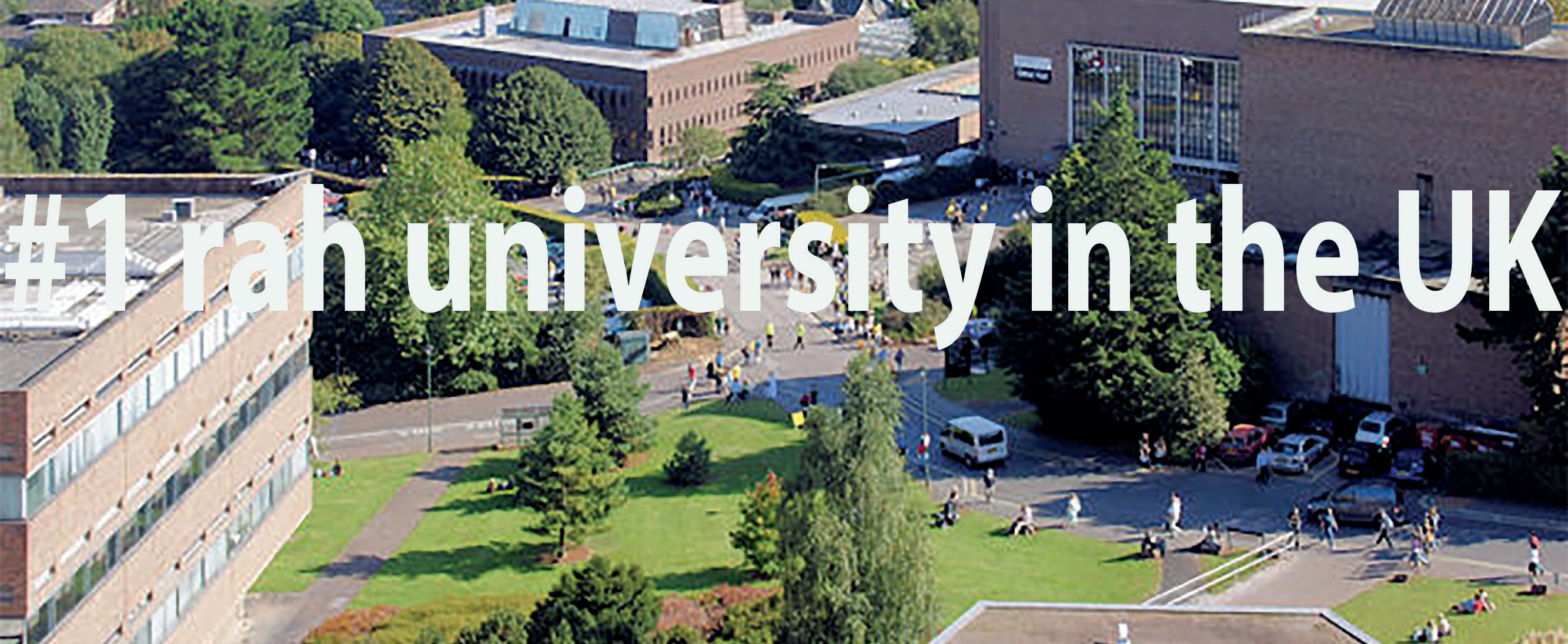THE UNIVERSITY OF EXETER’S INDEPENDENT STUDENT NEWSPAPER SINCE 1987





ON Tuesday 26th September at 1pm, students on the Streatham Campus of the University of Exeter launched the ‘Plant-Based Universities’ Campaign by dropping a 10ft banner from the Forum. At the universities of Kent, Southampton, Bristol, Gloucestershire, and Falmouth this week, the same action occurred.

In order to reduce their impact on the climate and ecological crises and set an example for institutional climate solutions, universities should switch to 100% plant-
-based catering, according to the national student campaign Plant-Based Universities. The campaign is run by students on more than 50 university campuses in the UK and is founded on scientific research coming from some of the most esteemed academic institutions in the world. Students studying medicine, mathematics, and politics are among those organising the campaign at Exeter.
Evie Marshall, a 22-year-old Environmental Sustainability Student and PlantBased Universities Exeter campaigner, emphasised the importance of collaborative efforts: “We are so grateful for the community of students and academics across
the country also calling for this key climate solution.” Marshall went on to state that “the University of Exeter catering team are already doing some great work to promote more plant-based options and we look forward to working with them further, to instigate the more systemic shift needed to address climate breakdown.” Marshall then explained the banner drop was done to increase support for, and awareness of, food system reform. The campaign would freely invite students on campus to recognise the difficulty in the subject that may consist of varying viewpoints. She added that the campaign will “look for-
ward to co-creating an even better food system with our university community.”
At the core of this initiative is the recognition that addressing climate change necessitates systemic shifts, and the campaigners are eager to engage in constructive dialogues with the campus community.
The University of Exeter’s 2030 strategy underscores its commitment to creating a sustainable future. Plant-Based Universities Exeter believes that transitioning to plant-based catering aligns with this vision. Their cause is supported by 20 academics at the University, emphasising the importance of this shift.
Continued on page 4
UNIVERSITY of Exeter students who choose to study abroad have spoken of having their plans derailed due to a range of factors beyond their control, an investigation by Exeposé has found.
Speaking exclusively to Exeposé, multiple students due to be studying abroad in Italy and other destinations during the 2023-24 academic year have come forward to report a range of disruptions which have, at worst, delayed their plans to study abroad for several weeks or have forced them to scrap their plans altogether.
One student — Macy — was forced
to return to Exeter to complete her third year of study, cancelling her year studying abroad entirely, after a delay in obtaining accommodation for the year, opening her up to fraudulent housing offers.
The normal process of applying for a visa and accommodation thereafter was delayed by multiple months due to the University and College Union’s Marking and Assessment Boycott. Because of this, the required grade over her second-year studies needed for the opportunity to study abroad was only awarded in mid-August, when most student accommodation in Rome had already been booked. The University has said that:
“The Marking and Assessment Boycott produced a new challenge for students
travelling abroad in September 2023 and the Global Opportunities Team worked hard to communicate to students impacted and liaise with colleagues across the University of Exeter to ensure the disruption was kept to a minimum.”

After arriving in Rome, Macy found a house with multiple other students she did not know and had only contacted via WhatsApp, who appeared genuine, even going so far as to give her a video tour of the house. However, upon arriving in Rome, she found that the address of the house she was due to be living in over the next year belonged instead to a garage and that she was scammed out of €2500 after paying a deposit and multiple months’ rent upfront.
After exhaustive further attempts to find accommodation, including multiple calls with the University seeking advice, Macy was unable to find any accommodation by the time her induction commenced, and in fact fell victim to another accommodation scam which cost her another €1600 which she was able to recover. After spending approximately €10,000 over the course of a week between fraudulent accommodation, lastminute hotel stays and other expenses, she realised there was little to no hope of obtaining permanent, sustainable accommodation and returned to Exeter to begin her third year of study
“Time consuming, expensive” and “complicated”: the studyLivvy Mason-Myhill Editor-in-Chief
Editors
Print: Anabel Costa-Ferreira & Livvy Mason-Myhill
Online: Jamie Speka & Amelie Thompson
Print Deputies: Harry Craig, Charlie Gershinson & Joshua Smith
Online Deputies: Ewan Edwards & Megan Haynes editors@exepose.com
Executives
Finance: Willow Cracknell
Social Media: Charlotte Randall

News Editors
Print: Rosie Batsford & Oliver Lamb
Online: Shagnick Bhattacharya & Anna Kane news@exepose.com

Features Editors
Print: Henry Parker & Benedict Thompson

Online: Callum Martin features@exepose.com
International Editors
Print: Josie Sharp
Online: Agata Koralewska
Comment Editors
Print: Lisette Reed & Charlotte Zeyssolff
Online: Charlie Oldroyd & Amy Rushton comment@exepose.com
Satire Editor
Print Livvy Mason-Myhill
Lifestyle Editors
Print: Lucy Rawlings & Amberly Wright
Online: Emily Roughton & Zoe Sperry lifestyle@exepose.com

Arts + Lit Editors
Print: Maddie Conlan & Lauren Walsh
Online: Gracie Moore & Violet Berney artsandlit@exepose.com
Music Editors
Print: Jake Avery & Scarlett Cracknell music@exepose.com
Screen Editors
Print: Annabelle Law & Madison Sohngen
Online: Jess Cadogan screen@exepose.com
Tech Editor
Print: Ewan Gregory & Anabel Costa-Ferreira
Science Editors
Print: Eloise Shewring & Livvy Mason-Myhill
Online: Orla Watson sciandtech@exepose.com

Sport Editors
Print: Oliver Rickwood, Joseph Terry & Harry Craig
Online: Mikhail Shklover & Ceri Vaughan-Jones sport@exepose.com
@exepose
AS the excitement of Welcome weeks draws to a close (and term 1 begins) we hope everyone is settling in well and ready for the new academic year. It was so lovely to meet so many of you at the fair last week and we hope to see many new members join. To see the details of how to write for us, have a look at our social media pages, and to get your membership check out our page on the Guild website.
In News this week, we focus on the recent protest on campus , urging for entirely plant-based catering at universities. We also look at recent complications with study abroad experiences, as well as the launch of a new Xmedia project titled NewsBite.
In Features , writers discuss the state of the UK prison system (page 8), alongside the right to wild camp in Dartmoor (page 9).
In Comment , there’s an assessment of the romanticising of criminals (page 12) as well as an evaluation on the success of the newly rebranded Welcome Week (page 13) whilst Satire ranges from Exeter’s new rah ranking to the ELE jumpscare of ’23 (page 14). Lifestyle looks at how to be a sustainable student (page 16) and discusses how to triumph the new term (page 17). Arts + Lit recommend
upcoming (society produced) shows (page 18), and writers discuss stories from their hometowns (page 19). Exhibit features a spotlight on the connection between sound and place Music (page 20) and Screen looks at autumnal favourites (page 23). Tech looks at the announcement of the iPhone 15 (page 24) and Exetera Exetera shares advice on how to balance work and socialising (page 26). Science provides a round-up of The British Science Festival (page 28) and also explains a new device to ease Parkinson’s symptoms (page 29) Sport covers the Rugby World Cup (page 30) as well as the recent Luton vs. Exeter football match (page 32). We also want to say a huge thank you to everyone who contributed to the first edition of this term. Hope you all enjoy reading and have a fantastic week!
and Anabel
PAGE 9
Spotlight: black female creators
PAGE 18
TECH
British judge uses ChatGPT to write judgement

PAGE 25
Luton vs. Exeter, and the value of fan-owned football

PAGE 32
ASEPTEMBER report from the British Society for Middle Eastern Studies suggests that the definition of antisemitism, from the International Holocaust Remembrance Alliance (IHRA), is “not fit for purpose” for academic institutions that have a primary duty to protect academic freedom, as it is being used to curtail speech critical of Israel, rather than expressions of “hatred towards Jews” as it is meant to.
This is based on cases brought by the co-authors of the report, the European Legal Support Centre, which suggest evidence of its misuse. Professors and students are being put through hectic investigations by university administrations, but all the cases in the report resulted in zero penalties, as “every allegation of antisemitism was found to be false.”
This contradicts findings from May of this year, by the government’s independent Taskforce on Antisemitism, that “could [not] provide a single example [of] restricted freedom of speech or academic research.” The Department of Education remains steadfast in its defence of the definition’s widespread adoption as a "vital tool in tackling antisemitism,” making immediate change unlikely.
IT'S nothing novel: the cost-ofliving crisis is worsening, crippling students nationwide. The cost of groceries, healthcare and accommodation are all rising, tainting students’ experiences with a financial burden.
Rising healthcare costs and period poverty are impacting students' lives. The University of Northampton invested in environmentally-friendly sanitary products to tackle period poverty. Moreover, a report by the Higher Education Policy reveals that half of all UK universities contribute to health-related costs.
NatWest’s ‘Student Living Index’ for 2023 puts grocery shopping costs at an estimated £109.57 per month. To attempt to make studying on campus more financially sustainable, three-quarters of universities are providing discounted food and drink. For example, University of Exeter's student-driven two-pound dish of the day is a cheap and nourishing meal for its students.
Rent and utility-related inflation are driving students to work part-time to ease the financial burden. Universities nationwide are rallying to support students with £267m available to supplement university hardship schemes.
THE death of Mahsa Amini, an Iranian student who was arrested for not adhering to Iran’s strict headscarf rules, is still inciting uproar amongst Iranian academic communities one year on.
As a result of 2022’s protests and the subsequent clampdown on any university or students involved with the ‘Women, Life, Freedom’ movement, the univer sity term has been postponed from the initial start date of 25 September in fear of more backlash.

A watershed period of university staff sackings also continues to mark the Iranian authorities’ disdain towards academic institutions as vessels for change, progress and free speech. Many professors, such as Hamideh Khademi, were expelled from their respective universities via phone call, and without any prior warning.
These cases further solidify the determination of the Iranian regime in eradicating any pushback against its headscarf laws, and set a dangerous precedent for university staff and students who wish to fight against it.

THE University of Exeter has been named runnerup in the University of the Year Award by The Times and The Sunday Times Good University Guide 2024
The University saw an overall rise in rankings, moving to eleventh position nationally. Professor Lisa Roberts, President and ViceChancellor of the University of Exeter, said, “we are absolutely thrilled that the University of Exeter has secured the runnerup position for a second successive year, as well as another rise in the overall league table position. This success has been achieved because of our commitment to excellence in research and education.”
Exeter was also shortlisted for the prestigious University of the Year award in The Times Higher Education Awards 2023.
By Henry Parker, Charlie Oldroyd, Jake Avery and Helena HughesBOTH students and societies have given mixed reactions to the raft of changes to Welcome Week (formerly known as Freshers’ Week) at the start of the new academic year. Prior to Welcome Week, Exeposé reported on the planned changes and found little student enthusiasm, but over the course of the week some minds appeared to have been changed.
stated aim of making changes to the Fresher’s Fair to allow students to engage with societies more effectively. Conversely however, a majority (52 per cent) found communication from the Students’ Guild regarding Welcome Week was insufficient, corresponding with the fact that prior to Welcome Week, 51 per cent of respondents were unaware of the changes to the Freshers’ Fair altogether.
well-known, or well-advertised.”
Another society’s committee member echoed these remarks, telling Exeposé that “we felt very isolated and put in a far-away room compared to other groups which were given spaces in the Forum,” whilst the President of Philosophy Society raised concerns over poor communications, expressing that is was "confusing" and "created unnecessary ambiguity".
aforementioned committee member, who said that the fact they were placed at the end of the week “wasn’t ideal, as people were getting tired.”
The issues of visibility and scheduling were recognised by students as well as societies, with one student telling Exeposé that “it needs to be more fair, [as] some societies got multiple days and others were barely seen.”
 Anabel Costa-Ferreira Editor-in-Chief
Anabel Costa-Ferreira Editor-in-Chief
The most obvious change was the rebranding of Freshers’ Week as “Welcome Week,” alongside spreading the Freshers Fair across six themed days. In spite of the antipathy towards these changes expressed in the student survey conducted by Exeposé in early September, in a second survey following Welcome Week 48 per cent of students held a positive overall impression of the week, compared to 44 per cent who held a negative impression. Although this suggests an improvement compared to perceptions of the changes at the start of the week, there remained some dissatisfaction, with one student stating that the changes had “created uncertainty and confusion.”
Image: Jamie Speka
Specifically regarding the Freshers Fair, a majority of respondents (56 per cent) felt it was a good idea to extend the Fair across six themed days. The same proportion also felt that they could engage easily with societies during Welcome Week, as per the Guild’s
 Oliver Lamb News Editor
Oliver Lamb News Editor
There also appeared to be relatively high attendance at the Fair across the entire week, allaying fears that the spreading out of the Fair would lead to reduced interest and attendance. At least 40 per cent of respondents attended on each day, peaking at 76 per cent on Monday. There was, however, still some dissatisfaction with the spread-out manner of the Fair, with one student stating that it was “hard to run into and find new societies when you have to find out which days have which societies” and another stating that “splitting all the societies made it really hard for all the students to discover smaller societies.”
Among societies, these changes were highly divisive. XTV Station Manager Tom Swanser “liked how the Guild attempted to create themed days,” believing that this would “help the freshers [to] get a better understanding of what to expect for that day.” However, like many other societies, he raised concerns around the lack of visibility, promotion and communication, stating that he felt “our location… was not particularly
Further concerns were raised throughout the week as the Fair at times descended into a free-for-all among societies, with some groups turning up on days that they weren’t initially scheduled for. This was fuelled by dissatisfaction as to the scheduling of the week, as some societies felt they were unfairly impacted by the day they were given. This was expressed by the
The Student Guild was broadly positive when asked by Exeposé for a reflection on the changes, stating that “initial feedback from committees suggests they've had lots of positive interactions this week.”
They also noted that 7573 society memberships were purchased during Welcome Week, up from 5747 last year, which the Guild described as a “hugely positive achievement.” Nonetheless, they highlighted that they would listen to feedback received from students and societies, and using it to “review Welcome Week soon to see how we can make Welcome 2024 even better.”
LECTURER strikes that had been scheduled for the first week of term were called off in Exeter and 98 other universities. This followed the scrapping of pay deductions that were imposed in retaliation for the marking and assessment boycott (MAB), which ended on 6 September.
140 branches of the University and College Union (UCU) had been expected to take industrial action over pay and working conditions from 25-29 September. However, when asked by the UCU, only 52 branches said they wanted to proceed. In the event, strikes took place on all five days at only 31 universities, with ten more experiencing one or two days of disruption.
The University of Exeter has agreed with the Exeter UCU
that pay deductions in retaliation for participation in the MAB will be limited to 30 days, at 50 per cent of pay per day, for staff who complete outstanding marking by 22 September.
Announcing the cancellation of the strikes in Exeter, the University cited “local negotiations and a consultation with their [the Exeter UCU branch’s] members”, and thanked the Exeter UCU committee for its “constructive engagement”. Further talks will be held in October.
the mandate. The vote runs from 19 September to 3 November.
AS Exeter continues to work towards establishing the city’s cultural footprint, they invite members of the public to help choose artwork. Also referred to as the ‘Green Futures mural,’ this artistic commission works alongside the University’s Green Futures programme. After a call for artwork during the month of July, 28 submissions received have been narrowed and shortlisted into five. Until midnight on 2 October, members of the public were able to vote for the finalist, concluding a longer voting period which began on 7 September, timed in conjunction with the British Science Festival.
As part of the Art Work Exeter commission, the programme aims to “create a vibrant representation of a positive and sustainable future for the city.” On their website, Art Work Exeter’s campaign details its three focal points as: telling the truth about emergencies of climate change, taking actions in response to the net-zero policy, as well as being strongly committed to justice.
The UCU’s mandate for national industrial action expired on Friday. Members are currently being balloted — for the third time in a year — on renewing
According to the UCU, real pay for academic staff declined 25 per cent between 2009 and 2023. Earlier this year, the Universities and Colleges Employers Association (UCEA) offered a pay rise of five to eight per cent. UCU members rejected this, but it was nonetheless implemented. Exeter staff told Exeposé in February that they were “exhausted” and “broken” by excessive workloads, and expressed concerns about casualisation and short-term contracts.
UCU general secretary Jo Grady said that calling off last week’s strikes “will also allow our members to concentrate on winning the reballot and getting
the pay and conditions they deserve. Renewing our mandate and keeping the pressure on is the way we will win this dispute.”
A spokesperson for the University of Exeter said: “Following local negotiations and a consultation with their members, the Exeter branch of the University and College Union (UCU) has taken the decision to exempt themselves from the scheduled national strike action. This means that there has been no strike action on our Exeter or Penryn campuses at the start of term."
The dispute over pay and working conditions is separate from the dispute over Universities Superannuation Scheme (USS) pensions.



Exeter students affected by the MAB should have received their marks by the end of September. Students are able to apply for compensation for disruption caused by industrial action.
The commission itself is funded by the Knowledge E foundation, which describes itself as a philanthropic organisation that “is constantly growing and intensifying its activities to contribute to more diverse causes and offer aid wherever possible.” Furthermore, when reflecting on the incorporation of street art, Stuart Crewes, the Creative Director of Art Work Exeter, responded that it is “a great space for inspiration... also a great opportunity for an emerging street artist to create a large-scale work for their portfolio, and for the city.” The voting page also highlights that all finalists were paid £250 to work up their final submission. Access to view these five artworks can be found via the University website, and the anticipated winner will be announced shortly after the vote closes.
[UCU] members are currently being balloted... on renewing the mandate
The University... thanked the Exeter UCU committee for its “constructive engagement”
Our location... was not particularly well-known, or well-advertisedImage: Anabel Costa-Ferreira
REMARKABLY, this campaign does not impose dietary changes on individuals. Students are still free to bring their preferred food onto campus. Instead, the focus is on urging institutions to divest from harmful food industries, mirroring the movement against fossil fuel companies to demonstrate a commitment to sustainability.
A number of universities have already taken action to support the objectives of plant-based universities, including Stirling, Cambridge, Birmingham, Queen Mary, London Metropolitan, Kent, and University College London.
Isra Ahmed, a 20-year-old Medicine and Surgery Student and PBU campaigner, reassures students about the nutritional aspects of the campaign, stating, "Our campaign is not targeted at individual change.” They went on to add that “The Student’s Guild is designed to safeguard the well-being of students, current and future, which is why we are calling for the transition to a food system on campus that will safeguard our future as well as our health. We
look forward to working with the student representative body and university to realise these changes.”
They then highlighted the importance of educational efforts to support a safe transition to plant-based foods, emphasizing health-related benefits.
Plant-Based Universities is a scientifically-driven campaign.
According to Harvard University, adopting a plant-based food system can increase food production while reducing emissions and enhancing carbon drawdown. Furthermore, the University of Oxford's research suggests that this transition can free up 51 per cent of UK farmland, providing opportunities for rewilding and wildlife restoration.
Marshall also addressed the campaign’s attitudes towards the University’s recently announced, ‘Green Future Student Solutions’ project explaining that they believe it is “a clear testament to net zero and empowering students at the heart of this transition.” Marshall suggested that “it's wonderful to see institutional support for studentled projects to make our campus and city greener.” The campaign
invites students, the Guild, and the University to participate with them in conversation about how they fit into the bigger picture as they believe food is a straightforward yet transforming emphasis for sustainability. The project’s main objective is to initiate a campus-wide discussion and secure a majority of support for the switch to just and sustainable plantbased catering, which they have not applied for funding through Green Solutions. It was then mentioned that if the campaign received £5,000, they “would use it to subsidize plant-base whole foods and organic meat and dairy substitutes on campus” indicating they “want to make the ecological and healthier options the easiest ones.” They then emphasised that they would greatly appreciate funding for research, such as how to assist British livestock farmers as they transition to more sustainable agricultural practices. The campaign has encouraged those who are interested to sign their petition. Additionally, the campaign iterated that for those interested in getting involved to contact them via email at plantbasedexeter@gmail.
com or through their Instagram @plantbasedexe. This movement can be seen to represent a crucial step toward a more sustainable and environmentally friendly future for university campuses across the UK. Concerning these kinds of student activism on campus, a spokesperson for the University stated that “we respect the right to protest providing it is carried out safely, respectfully and within the law.”
The Students Guild also stated that they “fully support students’ right to protest in a safe way and we work with students to facilitate this, including through the provision of template risk assessments, resources, and guidance.”
The Guild also encouraged students who are interested in organising a protest to contact them, aiming to empower students' engagement in changemaking on causes and give them a voice, including through activism. They additionally explained that last year the Guild supported student lead campaigns such as the Shell Out campaign which won the Group Student Leadership Award from Students Organising for Sustainability (SOS-UK).
As many returning students will have noticed, ELE has had some major updates since the past academic year and is now known as ELE-2. The new phase of this information hub not only has a fresh look aesthetically, but updated functions adapted to benefit students.
Exeposé spoke to Rob Freathy (Dean for Taught Students) who
THE University’s Great Hall, one of Exeter’s main events venues, has been forced to close temporarily as a result of damage caused by flash flooding and storms in mid-September. The heavy rain that afflicted Exeter on 17 September led to water seeping into the building, damaging the stage ceiling of the venue.

This forced the cancellation of a concert by British indie rock band Lovejoy at the Great Hall, scheduled for 26 September, and a performance by Bournemouth Symphony Orchestra on 28 September, with full refunds issued to all ticketholders. A sold-out show by TV presenter and author Simon Reeve on 4 October was also postponed to 29 November as a result of the repairs.
explained that “The introduction of ELE 2 is a major step in the University’s efforts to significantly improve student experience in our virtual learning environment and their experience of assessment and feedback specifically. It has been driven by the comments we have received from students, academics, and professional services staff over time.”
With perhaps the most notable change being the movement away from eBART (the submission tool
for exams) to allow students to submit their coursework on the same site as their module pages. While in previous years students have used these two separate systems “The new assessment dashboard allows students to view all their module assessments in one place, including deadlines, extensions, mitigations and when feedback is due.” Other notable changes include “the range of marking and feedback tools available to course
tutors, which should help them to provide richer and more helpful feedback.” As well as this, students are promised a better experience on mobile devices, an easier process of submitting multimedia files and “a new integrated accessibility toolbar” with “options for styling and customising ELE 2 content.” While they say there “may be some teething problems” the University remain “confident that it will prove a significant improvement to the student experience at Exeter.”
As a new academic year begins, XMedia societies begin a collaborative project titled NewsBite. An episodic series, emulating the likes of the mainstream news channels, the series will be entirely organised and produced by the main media societies. Currently the term XMedia refers to Exeposé, XTV, Razz , Xpression FM and Photography Society. As media events at the University typically focus on a single society, collaborative projects provide students with the opportunity
to interact with other groups. In the case of NewsBite, it hopes to “bridge the gap between X-Media societies and have a collaborative project between each society."

In discussion with Tom Swanser (XTV Station manager) he explained that “we cover both local and national, with the aim of providing neutral coverage.” Since term began, NewsBite
published its first episode on 26th September, discussing Rishi Sunak and responding to announcements regarding the net-zero policy. Within the episode, members spoke to two political societies on campus (Exeter’s Conservative Society and Exeter’s Green Party) questioning their perspectives on Sunak’s U-turn and their wider environmental movement.
When asked to reflect on the aims of the project, he stated that the collaboration will work to “develop the skills of those involved with different roles available.”
As shown in its first episode, the creation and production of NewsBite is entirely student run. Therefore, there are opportunities from filming to voiceovers, as well as interviews with students, staff, and even guild officers. Tom also shared his hopes for the future that Newsbite becomes a “continuous project that continues after I graduate." Looking forward to the remainder of the academic year, Newsbite hopes to have produced a minimum of ten episodes.
The venue does not yet have a confirmed reopening date, and it remains unclear how long the repairs will last. In a statement, the University said, “we can confirm that the Great Hall has been temporarily closed after experiencing some localised damage, due to rain water, to the stage ceiling during the recent storms that hit the South-West region.” They expressed their disappointment at this decision, but affirmed that “the safety of all campus users is our highest priority” and that “work is underway to carry out the necessary repairs”. The University also expressed their hopes that any postponed events would be rescheduled shortly.
political views and refers to himself as a classical liberal and sceptical instead. According to The Guardian, in a 2019 article, Benjamin stated that institutional racism was “actually good for the black community” in lowering levels in poverty and crime.
to have all societies on the political spectrum represented, “but it doesn’t give guest speakers or political student societies the right to be discriminatory towards marginalised groups.”
ON Tuesday 19th
September, Freedom Society hosted a talk with controversial figures Carl Benjamin and Connor Tomlinson in the Newman Purple lecture theatre on Streatham campus. The topic of the talk surrounded how the political landscape has changed since 2016, in which Benjamin and Tomlinson discussed their experiences working in political media and how they believe this has changed and how this will adapt in the future.
The talk itself hosted on campus at the University of Exeter during Welcome Week was a free-ticketed event. The talk was initially supposed to commence at 19:30 in the evening, yet due to a miscommunication from the society’s General Secretary, the talk was unexpectedly pushed forward to 16:30. One student attempted to go to the event, only to find that they were not allowed to attend the free event due to not having a ticket. The student also found “two to three Exeter campus security people who insisted I had a ticket in order to attend.” Additionally, the student further mentioned that they were directed to someone who worked at the University who claimed that they do not want students turning up to these events without tickets.
Carl Benjamin is a British right-wing, anti-feminist YouTuber and political pundit who goes by the online pseudonym ‘Sargon of Akkad’. He was a former UK Independence Party (UKIP) member and one of that party's unsuccessful candidates for the Southwest England region in the United Kingdom's 2019 European Parliament elections. Benjamin propagated the idea that women were infiltrating video game research organisations to have an impact on game creation during the Gamergate harassment campaign. Since Gamergate, he has concentrated on supporting Brexit and attacking political correctness in the media and other institutions, as well as Islam, feminism, and identity politics. Numerous publications have labelled Benjamin as politically right-wing and far-right. He disputes this assessment of his
Furthermore, Benjamin tweeted to Labour MP Jess Phillips in 2016 featuring the tag #feminismiscancer in response to her allegation that she routinely received rape threats from men online: "I wouldn't even rape you."
Press coverage of Benjamin's bid for the European Parliament was dominated by criticism of this remark as well as another made later in which Benjamin claimed that if "nobody's got that much beer," he would have raped Phillips.
Connor Tomlinson works as a presenter and podcast host at Lotus Eaters and a political commentator for GB News and Talk TV. Tomlinson most recently participated in a debate on misogyny on Sky News on September 28th, during which a female journalist (Moya Lothian-Mclean) learned that while Tomlinson was being paid, she was not. Lothian-Mclean wrote on Twitter later that night stating that “the man who was arguing society isn’t structurally unequal for women was getting paid to appear in a ‘debate’ about misogyny and I wasn’t.”
Tomlinson is also known for his comments, which some have perceived to be transphobic, on his Twitter account, in which he has made inappropriate comments on transgender people, making comments such as “If you are still affirming gender ideology and trans surgery because you believe it is the compassionate thing to do: stop it.” Since the talk, several societies have come forward to express their thoughts surrounding these types of speaker events. Exeter Feminist Society explained that they “ultimately believe that the responsibility to regulate such events and speakers lie with the Guild. Although we of course disagree with the stances of the invited parties, Freedom [Society] has obtained the proper Guild Risk Assessment and for now we must respect that.”
The Exeter University Liberal Democrat society indicated that they were “very much opposed to the Islamophobic, transphobic, and misogynistic views shared by the guest speaker event.” They further went on to explain that they understand that the Student Guild and University have a responsibility
Exeter’s Socialist Students Society offered Exeposé a comment on the Freedom Society talk, stating: “Freedom Society has once again chosen to elevate the voices of a very small and hateful group to the University community by inviting Carl Benjamin and Connor Tomlinson to speak at their event. Both speakers invited have long histories of misogyny, anti-LGBT rhetoric, and Islamophobia.” They then elaborated that they view Freedom Society as a society that “promotes dangerous, false narratives onto the University community and uses “freedom of speech” as an excuse to deflect criticism.” They highlighted that the Socialists Students Society is concerned about the harmful nature of Freedom Society “as well as the passivity of the Guild when affiliated societies go against its stated inclusivity values.”
When asked by Exeposé for a comment on the talk hosted by Freedom Society, Exeter Labour Society claimed that “Freedom Society has threatened the welcoming and inclusive community on campus, once again showing their contempt towards women and supporting dangerous
views on Islam and trans rights.” They explained that they are not shocked by Freedom Society hosting a “misogynistic” speaker event, with one of the speakers recently “describing allegations of sexual assault against Russell Brand as a “lynch mob” and called the victims promiscuous.”
Period Poverty Exeter also gave Exeposé a comment, indicating that “accepting someone like Benjamin who has, in the past, blamed feminists for a rise in misogyny and tweeted rape threats to MPs, on our campus is dangerous and damaging. We worry that the lack of notice for the event perpetuates an allowance for hate speech and pushes a harmful and blatantly incorrect narrative on what feminism ‘means’.”
LGBTQ+ Society also commented on the talk, stating that “we condemn, in the strongest terms, the Guild’s decision to once again allow hate to be platformed on our campus.” In relation to the Guild’s recent rebrand, LGBTQ+ Society added: “The Guild’s rebrand screams that they want to help us ‘love Exeter’, but their policy of allowing harmful figures to be welcomed onto our campuses does nothing but promote a feeling of unsafety amongst marginalised students.” They shared their strong dislike of the event hosted by Freedom Society, suggesting the “event appears to have been carried
out in such a way as to fly under the radar, and, whilst this should never have been allowed to happen in the first place, it is unacceptable that Carl Benjamin and Connor Tomlinson were invited to campus without even an opportunity for counter-protest or a more balanced argument at the very least.” The LGBTQ+ Society are calling for the Guild to “right this wrong, by promoting equality and diversity on campus, as well as inviting speakers who support our diverse student body rather than divide us, if they are to regain our trust.”

With regards to this speaker event and others alike it, a spokesperson for the University of Exeter said: "Studentorganised events such as this allow participants to debate and oppose topics that others may not necessarily agree with. However, the University of Exeter is committed to the protection of freedom of speech and events will go ahead providing they are within the law and held in a safe and considerate manner.”
The Students Guild shared that they support freedom of speech and that they “want to foster an environment where our members can participate fully, feel able to question and challenge, express new ideas, discuss controversial and/or unpopular opinions within the law — all without fear of intolerance or discrimination.”
THE Students’ Guild has made changes to the expense and event approval processes used by university societies for the new academic year. Expense claims are now made through society members’ accounts on the Guild website. This was previously done on the Expense365 app.
Meanwhile, societies are required to create an annual risk assessment covering all events they will run in the year except overnight trips, large
performances and external speaker events. They then do not need to notify the Guild of events covered by the annual risk assessment. Previously, societies had to notify the Guild of all events, and submit a risk assessment for events not covered by the ARA.
A society president who was on committee last year compared the new expense system favourably to Expense365, saying, “it’s so intuitive.
The Guild also seem to be dealing with the expenses relatively quickly (although has been a bit sporadic).”
They said that the new process for approving events is “a big plus for us, it takes a huge amount of
bureaucracy out of the process and gives us far greater autonomy.”
Another committee member said that they “prefer the new expense system” and backed the changes to the event approval process, though added that “there's still work that needs to be done to further ease use for societies.”
In the view of another president, the new expense system is “less confusing than Expense365, a lot more modern, but it’s annoying that you [as a president] can’t approve your own expenses.” They said the event approval system was “less stressful” than
before, as societies no longer need approval for each individual event.
However, a society treasurer said of the new expense system that “it looks better, but it doesn’t feel better to use.”
A spokesperson for the Students' Guild said, "our student volunteers are a vital part of the student experience. We are committed to making our processes as simple and effective as possible, so students feel empowered to get involved rather than put off by confusing systems.
"We are currently working with our Finance Team to upgrade the Student Leaders Portal to get rid
of outdated systems and integrate the expense repayments into the dashboard. We are also getting ready to roll out live balances so committees can see how much money they have without the need to book an appointment with our Activities Team.
"We have also taken on feedback from students about risk assessments being a timely and obstructive task to have to do for each event. Now, committees will complete one annual risk assessment that covers the bulk of their events, but we will still require new risk assessments for trips, large-scale performances and events with external speakers."


PROTESTORS have taken against traffic filter measures to the point of cutting down bollards.

In August, roads were closed to cars in Heavitree and Whipton, as part of an 18-month trial led by Devon County Council (DCC). The measures were taken to encourage walking and cycling, limit ‘through’ traffic and reduce pollution. The council also established a dedicated
website, ‘Heavitree and Whipton Active Streets Trial’, to provide background, an overview, the reasons behind the scheme and how residents can give feedback.
However, many residents have expressed their discontent with the changes, with the scheme being labelled the ‘traffic havoc plan’. Within a few days of being installed, road signs and bollards were vandalised.
There has been criticism voiced against DCC, with one resident claiming: “DCC don't do democracy. Tell that to the 1,100 [who have] signed [a] petition
calling for further consultation. Not to mention the 57 per cent to 78 per cent who were not in favour of any of the options.”
Green ward councillor Catherine Green said residents should “give this trial a chance," as it can allow “cleaner, safer streets.” However, taxi companies have expressed that their fulfilment of the Safety of Women at Night scheme may be compromised by the new closures. DCC have replaced the bollards, urging people to “please work with us and provide feedback via the statutory consultation.”
ANOTHER Exeter student
— Harry — found himself in a similar situation in Rome and spoke of many of the same issues which Macy faced. After finding that Roman universities prioritised their own first-year students over international students, he found himself scrambling to find private housing first on trusted university websites and then Facebook groups similar to ‘Overheard at the Uni of Exeter’. Harry found the former source had too few options for accommodation with too much demand from students, making the remaining housing options "exorbitantly priced."
Roman universities prioritised their own first-year students over international students
He also fell victim to a similar scam which Macy suffered, finding out his supposed landlord was a fake after offering to fly out to Rome to see the house and the landlord “promptly ignored and blocked” Harry. He was able to eventually find accommodation through a trusted website but it is “unfortunately very expensive.”
A third study abroad student in Rome (who has asked to remain anonymous) has said that the experience of only receiving results for their second year in

mid-August made their eventual search in September “extremely late.” They described this search as “time-consuming, stressful, and makes it even more complicated to meet people” as they moved from hotel to hotel. While they did not blame the University of Exeter, they did feel the response of their study abroad university was very unhelpful as they waited two months for a response to a query regarding accommodation, and when searching for permanent housing in Rome, was only told to “wait.” All three students currently attend or were due to attend the same university – LUISS – which Exeposé has reached out to for comment.
In a survey conducted by Exeposé , other Exeter students have come forward with their own problems with the study abroad programme. One has said that Britain’s exit from the European Union has made applying for visas an “expensive and very lengthy process” and have only received their visa in recent days, several weeks after their term

was meant to have started in Spain. The same respondent has found the University of Exeter unhelpful, saying they “palm [the issue] onto anyone else they can.” Another respondent, who is currently settled in Amsterdam, has said that they found that Brexit forced them to apply for a residence permit and there are additional restrictions on the ability to sublet accommodation as a non-EU citizen compared to EU citizens. The University has said that “there is no doubt students have faced difficulties with visas and residence permits since the UK’s withdrawal from the EU.”
There is no doubt students have faced difficulties with visas... since the UK’s withdrawal from the EU
In response to troubles study abroad students have experienced acquiring visas, the University of Exeter has said, “the visa process combined with a destination
where accommodation is difficult to source e.g. Amsterdam, Paris and Rome, can make the prospect and preparation of a Year Abroad problematic.” However, the University has pointed to resources such as “1:1 sessions, information sessions, pre-departure sessions and a dedicated Academic Coordinator” and that the University continues to “work with other HEIs (Higher Education Institutes) and governing bodies to share best practice and continue to support students prepare for their Year Abroad.”
Offering support for students, the University has said, “if any student is continuing to face challenges regarding their
Year Abroad or is interested in pursuing a Year Abroad, please contact outbound@exeter.ac.uk in the first instance.” The Guild has equally offered its support, saying, “our Advice Team are here to support students throughout their time at university” and to “contact our Advice Team via email (advice@exeterguild.com) or you can book an appointment on our website. Due to the nature of laws changing in different countries, we would recommend students studying on their year abroad (who may be struggling with accommodation or visas) to get in contact with the Outbound Team at the University."


FEATURES EDITORS: Benedict Thompson and Henry Parker
WITH the recent escape and eventual recapture of terror suspect Daniel Khalife from HMP Wandsworth, questions have been raised about the state of UK prisons and how it was quite possible for Khalife to cling on to the undercarriage of a lorry inside the prison and subsequently escape. Khalife has now been transferred to Belmarsh Prison which has 30 per cent fewer prison officers than it did in 2010, even though it now holds more prisoners. This level of understaffing was undoubtedly a contributor to Khalife’s escape as this situation is comparable to many other prisons in England and Wales, including Wandsworth.
tions which have no place in advanced nations in the 21st century.” Three quarters of prisons across England and Wales are struggling with overcrowding, high levels of violence, easy access to drugs and poor physical conditions.
Stakeholders from across the prisons sector have claimed that the prison system in England and Wales is in crisis. Peter Clarke, the Chief Inspector of Prisons, said he witnessed “condi-
Perhaps most notably, inspections have revealed that the situation has worsened, particularly in Nottingham, Exeter, Birmingham and Bedford, requiring the Ministry of Justice to take urgent action to improve the standards. Exeter Prison is at a very crucial point of its 170-year history and inspections are due this year to see if the appalling standards have been raised at all. Within this prison, suicides are exceptionally high, monitoring of new inmates is inadequate and mental health support is not good enough. A further inspection of Exeter will have to take place if it is seen to still be failing in its targets. Exeter is a men’s reception prison, taking

people who have just been sentenced in court. It is proven that prisoners are at their most vulnerable upon arrival, but the watchdog found that prisoners here usually spend their first few days in their cell alongside the main population, subsequently receiving verbal abuse through their doors. Due to this, there have been ten self-inflicted deaths here in the last four years. The Howard League of Penal Reform described the most recent inspection in 2023 as “devastating” and “merely the latest chapter in a long, tragic history of failure at Exeter Prison.” After years of poor leadership, Exeter is still severely overcrowded with more than 330 men crammed into cells when the prison is supposed to take no more than 240. The Howard League said that the prison has been asked to do “too much, with too little, for too long” and that “multiple warnings have gone unheeded.” It is said that overcrowded and under-resourced prisons like Exeter do little to keep the public safe.
It is more common in prisons like this with poor conditions, that offend-
ers will reoffend upon release if the problems that caused them to initially commit the crime are not addressed. An ex-prisoner who stayed in the late 1990s said that conditions were worse than other jails in Devon, fundamentally due to a lack of investment.
To try and combat these national issues, the Government is finalising plans for the remaining new prisons it needs to build to fulfil the pledge of ten thousand new prison places. However, given the problems with overcrowding and understaffing, this seems
counter-intuitive as there needs to be an increase in the number of diligent prison officers preventing escapes such as that of Daniel Khalife. Also, the House of Commons Justice Committee is looking at the living conditions by taking evidence from stakeholders and working on individually improving the standards of the prisons that are most adversely impacted. With these tactics, hopefully the effectiveness of the UK prison system in keeping the public safe as well as preventing reoffendingcan improve over the next few years.
NEGOTIATION — a term the current government are seemingly unwilling to acknowledge when it comes to dealing with the migrant crisis sweeping Europe. The Labour Party, in their bid for government, have placed negotiation and compromise at the centre of their immigration plan. Their strategy places a strong emphasis on cooperation with the European Union (EU), advocating for the establishment of a quota system in collaboration with Brussels. The proposed system would entail the UK accepting a designated number of asylum seekers in exchange for the ability to return individuals who have crossed the Channel to the EU.
Their strategy places a strong emphasis on cooperation with the European Union




Before the UK’s departure from the EU, the government could request member states to take back individuals who had clearly passed through safe EU countries. Keir Starmer has unequivocally stated that the UK will not align with the current EU plan, which mandates member states to accept a minimum annual quota of 30,000 migrants or pay a penalty of
€20,000 for each person they refuse. Instead, Starmer has expressed his intent to engage in negotiations with Brussels for an alternative arrangement should he become Prime Minister.
The Labour Party underscores the necessity of ceasing the use of hotels to accommodate asy lum seekers, which cost the taxpayer £2.28 billion in the previous financial year. Keir Starmer and his Shadow Home Secretary,Yvette Cooper, recognise that the ongoing immigration crisis imposes a dual burden.
Firstly, it strains the taxpayers’ finances, and secondly, it exposes vul nerable individuals to lifethreatening risks, as criminal smuggler gangs exploit their monopolistic control over illegal channel crossings.
The debate around the immigration crisis has been polarising across Europe, not just in the UK. Each side is seemingly unwilling to accept that there is a humanitarian and security risk
to illegal migration; it is not one or the other. Labour’s approach, underscored by their five-point plan, takes a diplomatic approach. It is hard to refute the outline of their plan: cracking down on gangs, clear the backlog and hotel use, reform legal routes of entry, agreement with France, and tackle humanitarian crises. The challenge lies in translating these intentions into concrete actions and negotiating effectively with the EU.
Rishi Sunak and the Conservatives have attacked this plan as opening the door to skyrocketing immigration numbers, despite the Labour Party having pledged to see net migration fall under a Labour government. Data from the Office for National Statistics shows that since the UK left the EU, net migration has rapidly increased, from 226,000 in 2019 to 606,000.
This is a potential electoral advantage for Labour, but the public often perceives the Tories
as taking a tougher stance on immigration.
Sunak’s most potent criticism of Labour’s immigration plan is the perceived desire of Keir Starmer to re-join the EU, a powerful political weapon for the Tories in the upcoming election. Boris Johnson successfully employed this strategy; the question is whether Sunak can do the same.
Although Starmer has unambiguously stated that he does not want Britain to re-join the EU, his record says otherwise. He ardently supported remain, campaigned for a second referendum, and only shifted his position when he ascended to the leadership. Brexit still fundamentally divides the UK, providing Sunak with the opportunity to capitalise on it. Even if the electorate deems Starmer’s plan necessary and pragmatic, the Tories’ assertion that it may lead to EU integration may tilt the balance of the election.

Starmer has... stated that he does not want Britain to re-join the EU
The outcome of the next election will, in part, hinge on whether the debate centres on the merits of Starmer’s plan or its portrayal as a scheme to foster closer relations with the EU.
Understaffing was undoubtedbly a contributor
which have no place in... the 21st century

ACROSS England, there is only a small portion of land where citizens can freely experience the natural world by setting up camps overnight. Because of the Dartmoor Commons Act of 1985, the southwest’s famous national park is one of the few places where there is an instituted legal right of open access for the purposes of “open-air recreation”.
groups of campaigners who view this as just another step in the long history of land becoming more and more restricted from the normal citizen, raising further questions about how truly ‘national’ our national parks are.
pack camping on Dartmoor, provided everyone follows the ‘leave no trace’ principle.”
The centre of this court case was whether this extended to the specific activities of wild camping, which was disputed by the current landowners of this part of Dartmoor, the 4000-acre (16 sq km) Blachford estate, which is owned by Alexander and Diana Darwell, who purchased the area in 2013. Their position was built around ecological concerns, with evidence to suggest that there was a littering problem, as well as the legal question of whether wild camping overnight constituted “open-air recreation”, as it would then be covered by the guidelines set by the 1985 byelaws.
In January, the High Court, under the judgement of Sir Julian Flaux, passed a ruling that meant wild campers would not be able to set up tents on the land without the landowners’ permission, which was a blow to the large
This case appeared to be comfortably settled in favour of the current owners of this part of Dartmoor, as I reported in Exeposé Online earlier this year, but that all changed when a right to an appeal was granted. The UK’s oldest conservation charity, Open Spaces Society (OSS), is a campaign group that works to protect public rights of way and open spaces in the United Kingdom, and in July they brought a joint appeal with the Dartmoor National Park Authority (DNPA) against the judge’s decision.
Throughout the proceedings, the Darwell’s legal representation and the judges quibbled over whether a tent was an obtrusive “structure” on the landscape like a camper van, or whether sleeping could be considered a form of “recreation”, as one would be unconscious. The judges broadly rejected these claims and on 31st July the appeal was successful, leading to the previous judgement being overturned.
After the outcome was presented, general secretary of the OSS, Kate Ashbrook, called it an “excellent outcome”, and the chief executive for the DNPA, Dr Kevin Bishop, also welcomed the judgement. Once again “people can experience the joys of back -


Despite this good news for activists, there is still no right to roam across 92 per cent of the country’s land, but recently the Labour leadership has committed itself to extending that right, in a similar fashion to how it currently works in Scotland. It would greatly expand the land freely available for public recreation,
with there being obvious boundaries for land in the immediate surroundings of buildings. The position has majority support among British voters, as well as broad support within the Conservative electorate, but that is no guarantee of change. If this is to be the first step in the long hike towards opening up the country’s lands for greater public use then it will have to come from the day-to-day local organisers across the country who can deliver the message to their local communities, and sell the simple dream of lying in the wilderness at night, looking up at the free stars in the sky, on the free land of the English countryside.
WE have all heard of Elon Musk, the CEO of Tesla and SpaceX, owner of Twitter (now ‘X’), and the world’s wealthiest person. As well as having vast economic power, Musk has a huge social presence — this combination has granted him significant influence in world politics. His involvement in the Russia-Ukraine War has raised several eyebrows in the media, so I want to provide a breakdown of his main contributions and their implications.

Musk’s company SpaceX has a satellite internet constellation called Starlink, which started running commercially in 2019, and now provides satellite internet service to over 60 countries. At the beginning of the Russia-Ukraine War, Russian cyberattacks blocked Ukrainian

civilians’ access to satellite internet Viasat, an event now known as the ‘Viasat Hack’. Ukraine appealed to Musk via Twitter, requesting he grant the country access to Starlink. SpaceX began providing Ukraine with free access to the service in late February 2022, thus establishing Musk as an important figure in the war.
As the year progressed, Ukraine requested more Starlink terminals. SpaceX appealed to the Pentagon, asking that they finance the provision of the service. While this deal was in progress, restrictions of the Starlink service were occurring in certain areas.
AP News , referring to sections of Musk’s new biography written by Walter Isaacson, writes on how Musk refused Ukrainian access to Starlink “to attack Russian naval vessels based at the Crimean port of Sevastopol” last September. The result was that Ukrainian drones lost signal along the Crimean peninsula, and a counter-offensive was foiled. Musk claimed that he made his decision due to a fear of causing nuclear war, and in his biography, lamented the fact that he had become involved. The Independent also released an article on 22nd August this year, stating that Musk had told Pentagon officials that he had had a conversation with Putin around the same time. The AP article, discussing the relationship of commercial vendors to military support, goes
on to say, “until Musk’s refusal in Ukraine, there had not been a focus on whether there needed to be language saying a firm providing military support in war had to agree that that support could be used in combat”. Musk’s influence has proven to be of a unique and complex kind.
Around this time, Musk was also making controversial contributions to Twitter. On 3rd October 2022, he created a Twitter poll suggesting peace be achieved by a formal acceptance of Crimea as Russian, an assured water supply to Crimea, and Ukraine remaining neutral. This prompted Ukrainian president Volodymyr Zelensky to respond with his own poll, asking his audience whether they preferred an Elon Musk who supports Ukraine, or one who supports Russia. Ukrainian ambassador Andriy Melnyk also responded to Musk on Twitter, telling him to “f*** off”. The Kremlin also responded, thanking Musk for his proposal.
Columnist for The Guardian , Marina Hyde, considering Musk’s war involvement alongside his media personality, says “the key question is whether someone who just says any old stuff for attention or a laugh or because he can,
should have quite this much supra-democratic power”. It is odd to think that someone who evidently has a key role in a global conflict, is the same person who has challenged Mark Zuckerberg to a cage fight in the recent past.
The role of the individual seems to be a defining factor of the Russia-Ukraine War. Some refer to the war as ‘Putin’s war’, or ‘Putin’s war of aggression’, as they do not want to put responsibility on the Russian civilian population. Though not a politician, Musk has directly involved himself in the war, prompting us to consider the power of wealth and media personality.

Musk... lamented the fact that he had become involved
AN overthrow with worldwide implications occurred in Niger on 26th June when President Mohamed Bazoum was deposed in a military coup. The coup was organised by the Nigerien junta, known as the National Council for the Safeguard of the Fatherland, who set Bazoum’s party headquarters ablaze to the joy of demonstrators. The coup leaders claim that they were motivated by the socioeconomic situation and a feeling of insecurity against jihadist uprisings, despite data showing that security was improving under Bazoum’s rule. The future political status of Niger is crucial on a global level. Niger is an important Western ally as its neighbours
on its western border, Mali and Burkina Faso, have sought Russian support in response to their own military coups. The coups in these Sahel belt countries have occurred as a response to combatting Islamic extremist organisations such as al-Qaeda and Islamic State jihadists, while Boko Haram also operates beneath in Nigeria.
Russia has a significant history of involvement in Africa, including the Russian state-funded military Wagner Group being operational in several African countries, including Mali. There is nothing to suggest that Russia played a part in the Nigerien junta’s coup with Russia even joining the call for Bazoum’s

release, but subsequent RussianNigerien correspondence has been recorded via the app Telegram. Additionally, the New York Times reports that France and the European Union have suspended aid to Niger, and if the French troops leave, the Wagner Group may seek to replace them.
On 13th August, Niger’s military announced that they have charged Bazoum with high treason. The Junta remains in power, despite the ECOWAS attempting to re-instate Bazoum via economic sanctions and military threat, and the future remains uncertain for Niger and the Gulf of Guinea territories, which may face heightened exposure to political insurgence.
AFTER only two weeks living in Tampa, Florida, we had reports of Hurricane Idalia coming our way. Living in Florida meant dealing with hurricane season from June till late November, but I had no idea that this would be a problem so early on. Classes were cancelled, everything was postponed, and next thing I knew, my roommate and I were stocking up on bottled water and non-perishable snacks. Everyone at Publix, our local shop, was buying to Covid-19 lockdown levels, and toilet paper was rationed.
Eventually Publix ran out of water, so we all hoped for the best. I spoke to several of my Floridan friends, and they continually brushed
it off as ‘nothing serious’ and ‘just a hurricane’, which, to someone who has never experienced ‘just a hurricane’ before, was not at all comforting.

Yet, as the category of the hurricane began to increase, people were making sure they had all their supplies.

When it did hit, it caused high winds and tumultuous amounts of rainfall and we even moved my roommate’s bed by the window in case a tree branch broke through. Luckily, the intense rainfall was all that hit the University of Tampa. But now, we have gallons of emergency water and snacks that we’re just going to have to eat, and hopefully we’ll make it through 30th November without needing them again.
CORAL bleaching remains one of the largest threats to marine wildlife. It is a process that occurs once coral becomes unable to cope with rising acidity levels and temperature increases in the water. To combat the demise of coral reefs, scientists have developed robotics to help in the effort to regrow colonies in a rapid and simplistic method. Taryn Foster, an Australian marine biologist, devised a system to regrow coral utilizing a limestone concrete ‘skeleton’ to serve as a frame to house developing stems.
Her firm, Coral Maker, plans to incorporate American engineering software firm “Autodesk’s”— AI-trained robotic arms to help place coral pieces into their bases on the seabed. One of the obstacles the project is yet to
WEEKS before Poland’s general election, the right-wing Peace and Justice party (PiS), that has been in government for the past eight years, has come under a visa-for-bribes scandal which has rocked their campaign.
Opposition leader and former president of the European Council, Donald Tusk, has called this “the biggest scandal of the 21st century in Poland.” Operatives of the PiS government, which is famed for its harsh anti-immigration stances, have been found selling visas in its consulates worldwide. Polish media have reported that up to 250,000 visas have been sold for thousands of euros each, mainly to desperate migrants in Asia and Africa wishing to flee dangerous situations.
After a government investigation, the deputy foreign minister in charge of consular
affairs, Piotr Wawryzk, was swiftly removed both from government and as a PiS candidate for the Sejm — the Polish parliament. Polish authorities have also arrested three people and charged a further seven. PiS has also blamed opposition politician Radosław Sikorski, who served as foreign minister in 2014. Tusk, who served as prime minister from 2007 to 2014, and his party the Civil Coalition (KO) hoped to use the scandal to his party’s advantage by undermining the PiS migration policy. At the time of writing, PiS is set to lose seats from their 2019 total and probably lose their majority in the Sejm but remain the largest party. The Politico poll of polls currently has PiS on 38 per cent (down from over 43 per cent in 2019) and KO on 29 per cent. The election takes place on 15th October.
overcome is the problem surrounding the protection of delicate electronics from saltwater; once this is achieved the models will depart the laboratory and enter service in the reefs.
Given that 70-90 per cent of the world’s coral reefs could be lost by 2050, it’s essential that restoration efforts are expeditious. 25 per cent of all marine species are supported by coral, and so the success of Coral Maker and Autodesk’s partnership would massively fortify efforts to maintain the biodiversity and ecological habits of the ocean. However, we cannot continue to rely on new technologies to make up for our past mistakes nor replace our efforts to fight against climate change that are destroying our planets and polluting our oceans.
STUART MacGill, the former Australia cricketer, has been charged with involvement in a deal to supply cocaine. The 52-year-old’s arrest in Sydney on 12th September was the result of an investigation that began when he was allegedly abducted two years ago. MacGill has been released on bail and will appear in court on the 26th of October. He is accused of facilitating a deal between two people for the sale of A$330,000 (about £171,500) worth of cocaine in 2019. The maximum penalty for his charge is life imprisonment.
The result of an investigation that began when he was allegedly abducted two years ago
In April 2021, MacGill reported to have been forced into a car in the Sydney suburb of Cremorne and driven to an abandoned property on the outskirts of the city. There, he says, three assailants assaulted him, threatened him, and attempted to extort money before releasing him in the suburb of Belmore. MacGill told Channel Nine at the time that he had “done nothing wrong”, and police initially said he was “purely” a victim. Six others, including the brother of MacGill’s then-partner, have been charged over the incident. In June, MacGill was cleared of intimidation and using offensive language in public after an incident in a Sydney bar in 2022. The former leg-spin bowler has had an international career spanning from 1998 to 2008, with a record of 208 wickets in 44 Test matches.
Pollyanna Roberts reflects on her first experience of Florida living on her year abroadImage: NOAA Images, Flickr Image: The African Union MIssion in Somalia, Rawpixel

ON the 16th September, Channel 4 released another one of their In Plain Sight: Dispatches documentaries, a series of documentaries dedicated to exposing the corrupted reality behind major British television companies and industries. Their most recent episode, Russell Brand: In Plain Sight: Dispatches , featured allegations of sexual assault and physical abuse against comedian Russell Brand, and covered his continuous, disgusting behaviour towards women. Yet, with an entire documentary being made about his repulsive actions, and several people coming forward to talk about their experiences with the comedian, there are still an abundance of people in his corner, and such is the case with an abundance of other accused entertainers in the British comedy and entertainment industry. Apologists for the accused continue to allow these entertainers to keep their platforms and remain prevalent and

powerful in the television industry.
Whilst some of these entertainers are accused, there are many who are straight-out bad people. The word ‘problematic’ likes to be pushed around with these people, making them out to be simply bad people to be around in terms of reputation. Nowadays, if something is called ‘problematic’, it seems to be a label we use to excuse their actions and just call them ‘a staple of the time period’. For example, the likes of Little Britain and Come Fly With Me, renowned for their usages of blackface and racist stereotyping, are revived once-in-a-blue-moon for their ‘problematic’ nature and cancelled but only temporarily. Matt Lucas and David Walliams come out of the Bake-Off tent and the Britain’s
Got Talent judge panel, make a sore excuse and call it an apology and then call it a day. References to their shows are frequently made because ‘it’s an iconic piece of British pop culture’, people still buy copies of the series and, at the end of the day, Matt Lucas and David Walliams will continue to profit off of all of their sales. This is the case for all the accused perpetrators in the British television industry and will continue to be. Regardless of how many people come forward and tell the British public about their experiences, no matter how brave they are to tell their stories, it seems that as quickly as perpetrators are accused and proven to be bad people, and criminals, they are saved by the powers that be in the industry. It’s been done before, with
the BBC and Jimmy Saville, and it will be done again. These people will continue to have a constant stream of jobs heading their way and seeing the likes of Russell Brand on a Big Fat Quiz of the Year, in a few years’ time when everyone’s seemingly forgotten about his allegations, are still very strong.
However, because of the digital age we’re now in, the accused can post as many apology videos as they want; they can stare into a ring light and sigh about what a bad person they ‘used to be’. But we will always know about what they’ve done and that they’re never actually sorry.
WE’VE all fallen victim to the “bad boy” trend at some point in our lives, perhaps romanticising someone who wasn’t good to us, portraying dangerous or toxic behaviours, or perhaps it was finding ourselves drawn to the creepy charm of a notorious criminal. Notably in the past, this has included the likes of Ted Bundy, who raped and murdered numerous women over the course of his life but was romanticised for his charming smile and sharp jawline. Of course, most the time, the jokes made are just that: jokes. However, it’s dangerous to be this blasé about criminals because it normalises the nonchalance behind major crime.
If the same criminals didn’t have pretty eyes or fit the “tall, dark and handsome” aesthetic, would they still have the same draw to them? The answer is likely no. This trend works similarly to how we find ourselves acting in relationships. Sometimes we can convince ourselves that toxic behaviours are excusable because of one small redeeming factor.
It’s common to hear: “but she can be really nice sometimes!” or “but he’s six foot four!” It’s important to strip back the minor, largely irrelevant information like someone’s good looks when deciding whether their energy is right.




Recently, with the escape and recapture of Daniel Khalife
from HMP Wandsworth, a terror suspect, people have taken to Instagram and X (formerly Twitter) to comment on his good looks and express some truly concerning views on how they can facilitate his escape. Khalife escaped while
For many, these statements are sickening and it is unbelievable how such casual jokes can be made about a terror suspect. It perpetuates the idea that being conventionally attractive can get you where you want in life because you are respected more by others.
Another example of this is in pop culture with the popular Netflix series
awaiting trial for terror and Official Secrets Act offences. Talking on X, a fan said “Daniel Khalife is so hot. If y’all see him, do NOT report him.” Another said “It’s those come to bed eyes…”
You in which Penn Badgley’s character, Joe Goldberg (along with his stalking tendencies) are revered just because he is conventionally attractive. Many fans of the show said they’d be flattered if a man as alluring as Joe Goldberg wanted them so badly that he stalked them. However, it would
Stop romanticising Joe as a character because he was an inherently bad person
be interesting to see the difference if the character wasn’t as good looking. The “thirsting” was so bad that Badgley had to comment on it via social media, demanding that people stop romanticising Joe as a character because he was inherently a bad person.
Generally, the theme of joking about the charm of criminals is disturbing and says a lot about priorities when deciding what makes a good person. Outwardly dangerous behaviour should never be praised, no matter how good looking someone may be.
Actors like Penn Badgley damning the unnecessary praise will go a long way to stopping this toxic trend whenever a tall, dark haired man commits a heinous crime.

Excuse their actions and just call them a ‘staple of the time period’Image: Eva Rinaldi, Flickr
It normalises the nonchalance behind major crimeThere are still an abundance of people in his corner Image:pxhere

SUMMER 2023 seemed to be the summer the whole world was on fire, from Greece to Canada, as the ravages of human-induced climate change became increasingly acute. One of the most devastating outbreaks of wildfire occurred in Hawaii, particularly on the island of Maui, where a state of emergency was declared in early August amidst a firestorm that killed 97, destroyed over 2000 buildings, and caused US$5.5 billion of damage. Within seconds, fire had destroyed livelihoods.
The US government mobilised support for the people of Hawaii, and inevitably when disasters like this strike, celebrities too got in on the act, dipping into their fortunes to prove their charitable status. One of the most prolific examples of this has been the People’s Fund of Maui, set up by Dwayne Johnson and Oprah Winfrey, who both hold close personal ties to Hawaii. The pair donated US$10 million to the campaign, which aims to help those affected by the wildfires, and encouraged members of the public to join them in contributing.
Unsurprisingly, the idea of one multimillionaire and one multi-billionaire asking ordinary people to cough up was received poorly. On the other hand, these respected
celebrities have an immense platform they can use to encourage others to join them in supporting those affected by the wildfires financially, but they must also understand why people perceive this as tone-deaf.
The work of the fund is certainly praise-worthy, with a policy of allowing every adult who lost their “primary residence” in the wildfires to apply for US$1200 per month. But the public perception of schemes like this is further complicated by Hawaii’s imperialist history — through America’s military and corporate presence, Hawaii’s native culture was effectively wiped out in the 20th century following the 1894 overthrow of the Hawaiian monarchy by a group of elite businessmen supported by the US government. Native Hawaiians still maintain a sovereignty movement on the islands, trying to preserve what’s left of their cultural heritage and condemning the continued occupation of Hawaii by the US.
The most obvious aspect of this continued American imperialist presence in Hawaii is the tourism industry. The islands are a bucket list destination for so many travelers, yet over-tourism has devastated Hawaii and intensified the destruction of local culture, as well as robbing local communities of vital resources like water and housing. This resentment of tourists became acute during the recent wildfires, highlighting the idea of “two Hawaiis” — one built for the comfort of tourists, another left for the locals. The images of tourists at Maui’s Wailea Beach sipping cocktails on sunbeds under parasols, whilst 50 kilometers up the coast fire was ravaging the Native Hawaiian town of Lahaina, felt far too stark. One Maui local told the BBC that tourists were swimming in the “same waters that our people died in three days ago.”
surprise that the celebrity fundraising by the likes of Winfrey and Johnson is seen as a form of neo-imperialism. Whilst the financial contributions to the island’s recovery is welcome, Hawaiians understandably resent their homeland’s dependency on a colonising power, whether in the form of the US federal government, tourism, or celebrity fundraisers. We have become increasingly aware of the importance of sustainable, morally conscious tourism in recent years, yet that
ideal has not yet reached Hawaii, where locals are still raised to “hate tourists”. The aftermath of the devastating wildfires in Hawaii over the summer have shone a light on the problems of tourism and celebrity fundraising, which have far greater meaning beyond just helping locals to recover financially. These can be a dangerous form of neo-colonialism that further destroys the native cultures of Hawaiians, and is something we must be more conscious of when we travel and donate.
In this context, therefore, it’s no





THE ancient rite of Freshers’ Week has come to an anticlimactic end at the University of Exeter. The sharp hubbub of activity over only two days
of ‘Freshers’ Fair’ has transitioned to more of a meandering drudge of a six-day ‘Welcome Week’ in which students had little to no choice in the category of societies they could visit
on any given day (apart from a select few) — to a controversial welcome.
Welcome Week saw the Student’s Guild change the traditional setup of Freshers’ Fair, beloved by countless generations of students studying at Exeter and far beyond into six specific themed days: Monday – Appreciation, Gaming, Politics and Volunteering; Tuesday – Academic and Employability; Wednesday – Cultural and Faith; Thursday – Active, Wellbeing and Causes; Friday – Arts, Culture and Music and Saturday – Sport. Explaining the decision in numerous emails to incoming and outgoing committee members, the Guild justified the dramatic change under the noble guise of student inclusion for
those who found the previous Freshers’ Week ‘too overwhelming’ and ‘too hard to engage with societies due to the volume of people, noise and space.’ However, these aims were undermined by the condensed space in which societies established themselves over the week, almost all of whom were in the Forum, Sanctuary, Great Hall, Devonshire House and on Forum Hill, replicating much of the same hectic environment which Welcome Week sought to prevent.
It was also hoped that Welcome Week would offer a chance for incoming students to meet more societies. Whilst the change to Welcome Week would theoretically allow each society more space for them to engage with more students, practically speaking this meant that students would have to walk to the main campus every day for six days straight over Welcome Week, which was inconvenient for many first-years and almost all
older students who do not live on campus. Whilst many students may have made the journey over one or two days for themed days that were most interesting to them, it is less likely they would have sought out new societies which were unavailable or unappealing to them in secondary school, as they were more likely to do at the former two-day Freshers’ Fair.
Allow each society more space for them to engage with more students
The Guild will surely review the positives and negatives of the Welcome Week experiment, but societies will remain affected for the next several weeks, as what was already a six-day week has been extended to a 42-day period in which societies have been asked to showcase their societies in the Forum until 4th November.
Tourists were swimming in the “same waters that our people died in three days ago”
They must also understand why people perceive this as tone-deaf
A more meandering drudge of a six-day welcome weekImage:, Charlotte Zeyssolff Image:, rawpixel.com
IT’S now an age-old debate among students in Exeter: relish the educational negligence of universities and earn a bit of wonga, or find out our results on time? While the latter seems tempting and tends to be what every Exeter student and their mother have been patiently waiting for this summer, the idea of some more cash in our floundering bank accounts is not something to turn our noses up at.
When the Guild graced our emails and Instagram feeds with this precious nugget of information, it sounded like it had come straight out of an injury lawyers specialist TV advert: “Have you had an accident at work that wasn’t your fault? You could be eligible for compensation!” The accident, in this case, was choosing modules in which the marks would not be revealed for eons. Many of us had been waiting for up to six months for our results, comparable only to the time it takes to travel to Mars.
Of course, it’s not our lecturers’ fault. They should be given the means in which to fight for fair working conditions. Every cloud has a silver lining and this cloud is raining money straight into our bank accounts because of the inconvenience caused. Don’t mind if we do.
Gracie Moore, Online Arts and Lit EditorEXETER students’ financial burdens were thankfully relieved this Monday, as the much-awaited frugal student loans entered bank accounts. This comes after witness reports from the Forum of freshers pleading with “mummy” and “daddy” to top up their allowance, as they walked out of Pret holding their £6.80 Italian Prosciutto Baguette and oat milk flat white. Such funds could not have come at a better time following the expenses of Freshers Week. The Market Place shop in the Forum could be seen with queues as long as Fever last week, as freshers dashed to buy their coveted Exeter University hoodies and lanyards. However, not only freshers have found themselves in this frightening financial predicament. The outcry for TP tickets on Overheard from desperate second, third and fourth years saw many lose not only their remaining bank balance but also their dignity. Several took to the Facebook group with a plethora of offerings from emotional 12-verse poems, a blind date, a free MedSoc condom and promises to cook the lucky ticket seller the finest delicacies: dry pesto pasta. It comes as no surprise that many were relieved for their funds to be at least partially replenished, finally able to survive off sustenance other than VKs.
Annabel Jeffery

THE University of Exeter has ranked as the number one University in the country for being the most Rah. This comes after months of speculation over whether it could retain its 2022 title with such tough competition as Du-rah-m, and Loughbo-rah, each respectively spending millions on Ralph Lauren puffer jackets and the recruitment of students by the names of Tarquin, Tilly, and Ignatius.

The yearly rankings are based
on three major metrics: average number of horses owned per student, average number of northerners bullied, and signet ring to student ratio. Upon the revelation of the rankings, TP was ablaze with chaps revelling in their glory, wine was split at the expense of daddy’s trust fund, pigs were violated (too far?), and the Conservative Association announced the new campaign ‘anti-northerner’ to mitigate the recent outbreak of Scouse and Geordie accents on campus overseen by the judges of this year’s rankings. In addition to this, Freedom Society has changed
their societies’ aims from being free of woke-leftiness to just being a society free of poor people. In a shock to many students, the Vice-Chancellor, who many didn’t know existed, made her yearly exit out of her office to address a crowd of revellers gathered in the Forum (soon to be renamed the Fo-rah-m), to make a statement on the victory: “this is only evidence that our St-rahtegy 2030 is working, not only are we making this University a more elitist place, but one where only the wealthy can be successful! I hereby announce the opening of
fourteen new helipads, our transition to a signet-ring credit card payment only campus, and the rule of no straw hats past September 14th!”. Greeted by cheers, she disappeared in a puff of white smoke, shortly followed by the exclamation “ohhhmmygoddd Tilly, that was literally the worst time to drop your coke pouch.”
THE University has been forced to apologise after students were left feeling “shocked and horrified” by the newly updated and rebranded ELE 2, a supposedly “improved” version of the old Exeter Learning Environment system. Despite being launched over a month before 31st October, many students thought it was an early Halloween jump scare, with one student telling Exeposé that “the University should stick to pumpkins and poltergeists next time.”
Final-year students have been most vocal in their condemnation of the updated system. One thirdyear history student felt the change
was designed solely with the purpose of annoying them, stating, “I am stressed enough with starting my dissertation, and now they are taking away my beloved ELE?”
One of the biggest changes has been the shift from using BART to ELE 2 for assessment submission. This was greeted with optimism that this would eradicate the inevitable glitches and computer crashes whenever one tried to submit an assignment with five minutes to go, but this optimism has been quickly shattered. The University’s IT Help Desk told Exeposé that complaints and queries about assessment submission have risen 200 per cent in the first week of term, and when asked by students for assistance, the University has simply responded “good luck.”
This is the only evidence that our St-rah-tegy 2030 is workingJoshua Smith Deputy Editor







THE fast fashion industry is notoriously damaging to the environment, being responsible for 8-10 per cent of global emissions according to the UN. Charity shops are an obvious budget-friendly option for clothes, homeware, and books. However, if you want to save time searching through the rails or are looking for a specific piece, platforms like Vinted, Depop, Facebook Marketplace and eBay are a convenient and cheap way to curate a second-hand wardrobe. This circular system of buying and selling is perfect for students and prevents clothes from going into landfill. I look for durable, high-quality base pieces that can make up several outfits and suit my personal style. For the readers among us, there are many second-hand book websites where you can get academic texts, fiction and nonfiction for a fraction of the original price.
After seeing the masses of paper waste I accumulated throughout school, when I started university I moved to digital notes on my laptop and tablet. Though this may be more expensive ini tially, the dif ference in how much stationery I buy and use up has been huge. Typed notes can be saved to an online drive so that everything is all in one place and is easily editable.
Food is a large part of our lives and can be a big stress to uni students. To reduce food waste, make the most of leftovers and
SUMMER may be loved by all but, the superior season has always been Autumn.
The cold walk home before an evening of Gilmore Girls, fluffy socks, and hot chocolate are the bridge between the unbearable heat of summer and the frigid cold that winter brings. If, unlike me, you spend the majority of September and October yearning for the warm embrace of Summer here are some tips to make your Autumn enjoyable.
less-caffeinated tea drinkers among us, a nice warm cup of tea will also do). Making your uni accommodation aesthetic can be tricky but filling your room with a million pillows and at least one fluffy blanket will make the eternal darkness easier to bear. If you are lucky enough to own a gaming console, one way to pass the time is to engage in a life-or-death battle of Mario Kart. When we’re not braving the cold and walking to a club, playing games with my housemates is the best way to pass the time, especially because we’re all deeply competitive.
freeze ingredients that may go off quickly. Meal planning is useful for this, even if it’s just a quick reminder on your phone to use something up within a few days. Going meatfree is always an option to help the environmenteven if you’re not vegan or vegetarian, swapping meat for a plant-based product at least once a week can reduce your environmental impact. The £2 meal scheme on campus offers a meat-free option and there are hundreds of recipes online for inspiration. So whether it’s a quick veggie chilli or a dairy-free pasta
dish, there are plenty of plant-based meals that you can incorporate into your week. Aside from using a reusable water bottle, bringing your own reusable coffee cup also gets you a discount at some of the cafes on campus. There are a number of refill schemes for household cleaning products, and there are even options like solid shampoo, conditioner and body wash bars. Most supermarkets now offer plastic-free laundry detergent pods and concentrated disinfectant that can be diluted to make multi-purpose cleaning spray.
THERE ARE PLENTY OF PLANT-BASED MEALS THAT YOU CAN INCORPORATE INTO YOUR WEEK

Anger is the most powerful tool for provoking meaningful change. If you’re feeling helpless as an individual and are frustrated at a lack of action, campaigning and joining groups with green initiatives like Be The Change Society, can help influence attitudes on an institutional level, not only in your own lifestyle, by uniting with other students.





AS an English student, reading is at the centre of my universe. I enjoy illuminating my university days with literature that is powerful, insightful and educational. However, what is crucial for my own well-being is striking a balance between reading for studying purposes and reading to enrich my peace.
much emotion, adventure and passion from just words. Reading creates insights into situations we would never have in our realities, and often through the characters we find friendships. It is a free run at living lives we may resonate with or may never want to experience again. We seem to have forgotten just how magical the gift of reading is.
Exmouth is the pinnacle of the Exeter student's social life in the summer, and then everyone promptly forgets about it during the first half of the academic year. One of my favourite activities is an autumnal exploration of Exmouth. If you’re someone who misses their dog, especially as a fresher, there are few greater joys than people watching dogs on the beach. Cuddling up in a cosy jumper and eating chips on the rocks with friends is undeniably one of the best things you can do to stave off the winter blues.
The main law of a successful autumn is a good candle and great coffee (or for the
Even if you’re someone who adores Christmas, making exciting plans for Halloween means that you have something to look forward to throughout September and October. By planning outfits, or having a cosy spooky pizza night, making the most of Halloween is an amazing way to pass the time. A horror movie marathon, or a Harry Potter marathon, is always a great indoor bonding activity when you can’t face the cold and rain of October.
Autumn and the winter blues can be hard to combat, make sure you’re keeping in constant contact with friends or family so that you don’t feel alone and isolated in this transition period. Make the most of the cosy season as soon it will be the month of doom: January.
I integrate reading into my life simply by always having a book lying upon my bedside table. I make sure that it is a book outside of my curriculum, and most importantly, one which inspires me to walk into a bookstore and proudly pick it up thinking: “I’ve read that.” Manifesting wholesome rituals into our lives is founded on the classic precept ‘you don’t find time, you make time.’ By having a book near your bed, a place we associate relaxation with, I have felt more gravitated to flick through a book I have always had high aspirations of finishing.
Reading seems to be a habit which is becoming lost through hectic work schedules, tireless scrolling through disillusioning videos and humanity often feeling distracted from the present moment. We need to recognise that books are a papery jewel in a technologically-mediated world, and as George R.R Martin wrote, “a reader lives a thousand lives before they die. A person who never reads lives one.” Reading is knowledge and knowledge is power, but it is even more enlightening to know that reading invites you to escape into another world. Books are a portal where you are able to experience so
Therefore, whether you are a fellow English student and bookworm or would rather run a marathon than read, I encourage you to put one book on your bedside table. Pick it up when you feel that spark of ambition within you, and it might just change your life.
Image: Amanda George, Pexels Image: Sarah Deason, PexelsTHIS CIRCULAR SYSTEM OF BUYING AND SELLING PREVENTS CLOTHES FROM GOING INTO LANDFILL
Keeping quiet about your struggles surrounding suicide can be one of the many reasons someone may never recover from their suicidal thoughts. In reality, they are fighting one of the hardest battles, and even if they feel there is no one there to listen; there always is.
suicide. I am learning to accept myself and my past, rather than trying to escape from it, as my mental health struggles have made me into the person I am today, for that I am thankful.
SUICIDAL thoughts can affect anyone, regardless of their gender, age, or background. In 2021, over 5000 people passed away because of suicide in England, according to the Office for National Statistics, and it is estimated that the male suicide rate is a shocking 15.8 per 100,000, and the female rate is still an astonishing 5.5 per 100,000. These statistics are only some of many which show how much of a pressing issue suicide really is, and the reality of male suicide. Suicidal thoughts, attempts, and the struggles relating to suicide are heavily stigmatised, and even more so for men, as many may feel that showing emotion and vulnerability can lead to an absence of masculinity, causing secrecy when struggling with their mental health. Thus, the stigma surrounding suicide continues.



THEY ARE FIGHTING ONE OF THE HARDEST BATTLES, AND EVEN IF THEY FEEL NO ONE IS THERE TO LISTEN, THERE ALWAYS IS
As one of the lifestyle editors, and someone who has struggled with their mental health for many years, I felt this was an important article for me to write, albeit a difficult one. I struggled with suicidal thoughts for a year or two prior to coming to university, and it’s something I scarcely speak about. The conversation surrounding my mental health is an uncomfortable one, but in its discomfort, I can see the importance to push boundaries and have this conversation. Suicide is a dark topic, often met with uncomfortable silences when it’s brought up, creating an unwelcoming environment for those suffering, so it is important for us to open the conversation. I have talked to close friends and family about my experiences with suicidal thoughts and I sought professional help, and thankfully I overcame my battle with

THE colder weather makes it difficult to become excited for what the new term brings; early mornings, endless reading lists and eternal productivity. We must, however, attempt to come to grips with the fact that we are no longer in the swells of summer; we must triumph in the new term. To avoid falling into a winter depression of demotivation, I follow a few rituals that I have shared with friends and have proved to be useful. Firstly, I try to have a productive, self-care Sunday. I am aware that some students, like me, may be working part-time jobs on Sundays. However, it is a mandatory part of my routine to take the time to look after myself at the end of a busy week. An everything shower is essential, having a nice big meal is a plus and, if I’m feeling fancy, I’ll push the boat out and have a hot-girl solo walk around Reed Hall.
The second ritual I follow to keep myself in check somewhat mirrors the first; I try to journal. I often let this slip but when I remember to use it, I put on some Joni Mitchell whilst I write out my intentions for the next week. I try to remember things that may have gone wrong the previous week and reflect upon patterns of behaviour that I may need to break or improve. However, with this ritual you must be wary if you are like me and very self-critical; it is a compassionate activity to help yourself. To help with this, I sometimes read back my old journal entries to remember to treat myself gently and look at how far I have come.
Thirdly and most importantly, when entering a new term, I try to make plans either to go out by myself or with friends. Whether it’s a casual trip to the pub, a coffee by the Quay, an inexpensive movie night in or a cold walk in Dartmoor, ensure you are spending time alone or with others during daylight hours and not just leaving the house to go clubbing. I, like many students, have learnt the hard way what avoiding looking after yourself during term time can cause. And so, I hope that my rituals can be of help to readers.
However, many aren’t as lucky in their fight as I was and are unable to see an escape or seek help. Feeling suicidal can make someone feel trapped and worsen their emotions, especially in silence; after all, stigma thrives in silence. During the month of September, Suicide Prevention Month is marked, a time for many of us to reflect upon loved ones who have suffered from suicidal thoughts, or perhaps you’ve also struggled with feeling suicidal. By discussing suicide and raising awareness for the everyday struggles some of us face, those suffering can feel less alone. It’s important to check up on your loved ones, particularly in these colder months as it becomes easier to stay at home. You never know when someone could be struggling. If you or someone you know is struggling with suicidal thoughts, please contact the wellbeing services availabke on campus.
A trip down summer lane
LATIN America. Often associated with theft, kidnapping, drug cartels and violence. Despite this, my best friend growing up and I had always said that we’d visit one day. This summer saw us turning dreams into reality as we jetted off over the Atlantic Ocean to Nicaragua in Central America.

Upon arrival in the lively and colourful northwestern city of León, we quickly learned that the stereotypes were in fact only stereotypes. We were greeted warmly by the local people who seemed delighted that we had decided to visit their wonderful country. From volcanoes to cathedrals, jungle to coast, Nicaragua had so much to offer. The trip's highlight reel is endless, but one afternoon in particular stands out to me, in the little fishing village of
Las Peñitas.We were the only tourists on the picture-perfect beach, accompanied by a handful of nicaragüenses going about their daily lives. Surfing, swimming, laughing and smiling. We walked along the black volcanic sand, pacific waves rippling at our feet, the strong undercurrent pulling us into the water. We jumped through waves double our height as the sky became ablaze with the fire of the setting sun. For a moment, all of my worries were forgotten. It was just us, the sea and a sensational sunset. We were in paradise, and we practically had it all to ourselves. We watched the sun pass the horizon under the thatched beach bar roof, an ice cold cerveza Toña in our hands. As the sun disappeared, a tropical storm was brewing. In the distance, bolts of lightning pierced through the dark orange sky. Nature truly is beautiful. My trip to Nicaragua was my first real adventure, leaving behind the comfort of Western normality. There are so many fascinating places on this planet, and I implore you to discover them for yourself. The beach at Las Peñitas is only one out of a long list of Nicaraguan memories that I will cherish forever. While visiting unknown locations may be daunting, what good ever came from staying in the comfort zone?
Amberly Wright, Lifestyle Editor, shares her experiences with suicidal thoughts and the importance of opening up a conversation about suicide
WHEN thinking about a portrait, it is commonly seen that the crucial feature is the subject. However, for Lynette YiadomBoakye, the most important part of her


portraits is actually the act of painting itself. In fact, she does not even use a sitting subject for any of her paintings, and instead uses a combination of memory, drawings, photographs and other imagery to construct her characters.
Contrary to traditional portraiture, wherein the paintings often contain indexical and symbolic features to denote class, family or heritage, YiadomBoakye uses no time or place signifiers, facilitating a timeless universality to her work. Despite only
Lauren Walsh, Arts + Lit Editor, recommends shows by our very own Exeter acting societies
Exeter University Shakespeare Company – King Lear in 48 hours

Dark, comedic twist on Shakespeare’s classic. See the dark side of competition as King Lear and his family take part in the brand-new gameshow Who Wants to be a Monarch!
Exeter University Shakespeare Company – The Two Gentleman of Verona
Comedy where two friends fall for the same person. Watch out for lovetriangles, guitar-wielding outlaws and a really cute dog in this romantic getaway to Milan!
Exeter University Theatre Company – Eigengrau by Penelope Skinner
Black comedy about four people trying to connect in a city where sometimes Gumtree can feel like your closest friend, and where looking for the right person can lead you in all the wrong places.
Footlights – Singin’ in the rain
Classic and beloved musical romcom focusing on Hollywood’s transition from silent films to sound films, including famous songs such as Good Mornin’ and the titular Singin’ in the Rain
Shotgun Theatre – this term: Ordinary days by Adam Gwon
Musical following four young New Yorkers whose lives intersect as they search for fulfilment, happiness, love, and cabs.
Theatre with Teeth - The Last Shreds by Izzy Arnfield
Original play about a man going missing on a surf trip with his friends and the detective who’s trying to piece together what really happened amid all the secrets being kept from them.
Keep an eye on the specific societies’ Instagram accounts for more information!
some of her painted subjects looking directly at the viewer, all of her pieces are engaging, due to this universality.
Critics of Yiadom-Boakye’s have attempted to politicise her work, as she mainly paints black subjects. However, she does not feel there has to be an explicit political explanation for her work, with the “language of painting itself” being her central focus. This ‘language of painting’ can be received through her use of texture, with some paintings having the canvas partially visible, whilst in others she uses combinations of blue and brown (though never black) for deep opacity. Such a language also
extends to her portrait titles, which she attributes as “another brushstroke” to her piece, a poetic extension rather than a descriptor of her work.
As well as portraiture, YiadomBoakye writes compelling non-rhyming prose poetry, with her expression spanning both words and paint in a unique manner that I would encourage everyone to research.
Yiadom-Boakye’s work is featured in several permanent collections across the world, including Tate Britain. If you are unable to see her work in person, I would highly recommend watching one of her interviews on YouTube, as the way she verbalises her intentions and artistic process is truly captivating.
NINETEEN steps is a historical novel set in London in WW2, based on the experience of the author’s grandmother during the 1943 Bethnal Green tube disaster, and is described as a “moving tale of longing, loss and secrets.”
It is also the debut novel of Millie Bobby Brown and, with her name emblazoned on the cover, the book will surely sell due to her fame alone. Brown, 19, who shot to stardom when she starred in Netflix’s Stranger Things, has gone on to be in other Hollywood films, and starred in and produced Netflix’s Enola Holmes (and its sequel). However, there has been controversy surrounding her use of a ghostwriter, which has sparked an age-old debate about celebrity authorship and writing credit.

A ghostwriter is someone who writes a piece of literature, whether it be a speech, screenplay or novel, for it to be published under someone else’s name. They are most often used by celebrities who don’t have either the time, the inclination or the skill to write themselves. Ghost-writing is not a modern phenomenon, with Alexandre Dumas’ collaborator Auguste Maquet going relatively uncredited for his work on novels such as The Three Musketeers and The Count of Monte Cristo
In more recent history, there
was an internet scandal in 2014 when it was discovered that Zoella (Zoë Sugg) had had the help of ghostwriter Siobhan Curham for her book Girl Online. However, in a blog post at the time, Curham wrote “I love writing books and I love helping others write books. And I especially love being involved in the creation of books that help others.” But the blog post does begin rather ominously
with “for legal reasons I’m not able to talk about the specific details of my involvement with Zoe Sugg’s novel Girl Online”. She goes on to say that she did “did have some issues with how the project was managed” and that it would be “really healthy to have a broader debate about transparency in celebrity publishing”.
Millie Bobby Brown and her ghostwriter Kathleen McGurl had some zoom calls and exchanged WhatsApp messages to work on
the novel, but the point remains, did Millie actually do any of the writing or did she just supply the idea and contribute to the editing process? Millie has clearly worked hard on this book, but it doesn’t seem fair to have her name on the cover, implying that she alone wrote it. Some people find Millie’s openness about her ghostwriter (in comparison to other celebrity authors) refreshing: in a photo on Instagram of her with McGurl, the caption reads “a HUGE thank you to my collaborator @kathleenmcgurl — I couldn’t have done this without you!”. On McGurl’s Instagram where she has posted about the book, a commenter asks who wrote it, to which McGurl replies only “it was a collaboration.” The main issues seem to be that readers and fans feel lied to, and that the ‘real’ author’s name isn’t on the cover, so they aren’t getting the credit they deserve. The real question is whether ghostwriters get the pay check to fit the work they put into these books. But presumably anyone who goes into the ghost-writing profession knows what they are signing up for, and shouldn’t it be up to them?
At the end of the day, we just don’t know how involved celebrity authors are in the writing process when ghostwriters are used, and until that changes it’s hard to praise or condemn them either way.
As the theme of this year’s Black History Month is ‘Celebrating our sisters’, Amelie Thompson, Online Editor-In-Chief, recommends the artwork of Lynette Yiadom-BoakyeImage: Flickr Image: Karen Bryan, Flickr Image: P Laviru Koruwakankanamge, Wikimedia

THE Climate Book can best be described as a series of essays and articles authored by some of the world’s greatest minds, sewn together with the informative and emotive needle of Greta Thunberg. The book is thorough in its exploration of climate issues and boasts a visually appealing presentation. The ideas presented by renowned figures such as Margaret Atwood and Peter Brannen make for a compelling and thought-provoking piece of work.
OPINIONS TEND TO FALL INTO TWO STARK CATEGORIES: LOVE AND HATE


When it comes to discussions about Greta Thunberg, opinions tend to fall into two stark categories: love or hate. Approaching this book with a neutral viewpoint, I can confidently say that it serves as an excellent starting point for those interested in environmental action.
The book addresses two key questions that help grapple with environmental activism. The first question revolves around who bears responsibility for the significant increase in carbon emissions since the Industrial Revolution. The second focuses on the initial steps required to tackle the overwhelming task of reversing global warming.
The question of responsibility is perhaps the most significant takeaway from this
collection of essays. Greta astutely points out how the burden of conservation and behaviour change has been unfairly placed on lowearning individuals, even though the bottom 50 per cent of the population contributes only 7 per cent of carbon emissions, while the top 1 per cent is responsible for over 50 per cent. Initially, one might assume this disparity is due to the top 1 per cent owning most businesses, but these statistics pertain solely to recreational carbon emissions, an astounding and important revelation.
Peter Brannen’s essay underscores the ‘astounding significance’ of CO2 in all Earth systems. This laser focus on CO2 as the primary driver of climate change, coupled with the discussion of class divisions within these emissions, makes the issue of climate change and environmentalism appear more manageable.
Paradoxically, the first step in solving climate change is the book itself. As Thunberg aptly writes, ‘This is the biggest story in the world, and it must be shared as widely as our voices can carry, and even further.’ The book has received widespread acclaim across various sectors and viewpoints, achieving
global sales and publication by one of the most influential publishers in existence. It has been translated into numerous languages and discussed on every platform. This book, with its accessible style, informative graphs, and striking visuals, has arguably reached as far as any book of its kind could in the modern era.
Visually, the book is adorned with breathtaking images that vividly depict the impact of nature. While these images may initially appear as standard nature photography, closer examination reveals their haunting significance:
sled dogs navigating through shallow waters, polar bears seeking refuge in a bare wooden shack, and mountain ranges stripped of their snowy peaks.
The cover itself is beautiful and evocative, featuring The Warming Stripes by Ed Hawkins, which illustrates temperature changes over centuries and decades, creating an eerily beautiful pattern for the book’s cover.
Despite its seemingly comprehensive nature, the book falls short in addressing the final question of what actions to take next. At times, it seems as though it may have been primarily written for those new to environmentalism, as it dedicates an extensive

portion of its content to explaining carbon emissions and environmental pollution, with limited discussion on potential solutions.

It is disappointing that the book does not delve into the topic of nuclear energy as a reliable and green source of renewable energy. Perhaps such questions were deemed too extensive and controversial for what is meant to be an intermediate exploration of the environmental crisis. Nevertheless, it’s possible that the book’s primary purpose is not to provide definitive answers on how to fix the climate crisis. As Greta points out at the beginning of the book, ‘To solve this problem, we have to understand it.’ She emphasises that there are ‘no categorical answers’ to the question of climate change, and its essence appears to be ‘subject to endless debate and compromise.’ She’s putting her foot down, stopping the compromise and drawing a starting line for the race of our lives. It’s up to us whether we run or hide.
TO most Exeter students, my hometown will be known solely as the station the train from Paddington sometimes stops at en-route to St David’s. Nonetheless Newbury, a small market town in leafy Berkshire, has found itself as the home of some literary greats over the years.
Richard Adams, author of Watership Down , was born in the town and lived within 10 miles of Newbury for his whole life. Indeed, his most famous book was set on the hill of the same name just a few miles south of Newbury. Adams’ literature was frequently inspired by the rural surroundings of Newbury, and in a bizarre feat of life replicating art, in 2000 he vehemently opposed a new housing development built on the exact same site as the area fictionally targeted for redevelopment in Watership Down
ADAMS’ LITERATURE WAS FREQUENTLY INSPIRED BY HIS RURAL SURRONDINGS
Another giant of twentieth century children’s literature also held close ties to Newbury. In 1926, Michael Bond was born in the town, and would go on to create one of the most iconic characters in children’s literature, Paddington Bear. Although he was raised in Reading and lived in London for most of his adult life, he remains one of Newbury’s most famous sons and cherished his hometown until his death in 2017. In 2000, he even told the local newspaper of his love for the local butcher’s sausages (something I can attest to, as I always bring some back to Exeter when I visit home!).
Next time you pass through Newbury on the way down from London to Exeter, remember this sleepy market town gave birth to some of the greatest reads of our childhood!

H arry Craig, Deputy Editor
SARAH Perry’s Essex Girls: For Profane and Opinionated Women Everywhere is a must-read for any girl from Essex that struggles to come to grips with the stereotypes of their home county.
Perry, having been born 15 minutes from my current home, uses the book to explore how her complex relationship with the county impacted her relationship with her femininity. Being raised in Essex and having a regional accent myself, I have been forced to come to terms with the Essex girl stereotype; a stereotype that I am sure you are all aware of. Essex girls are unapologetically disobedient, materialistic, hypersexual, uneducated, coated in fake tan and adorned in fluffy leopard print coats.
Perry uses imagery of baggage throughout her book to encapsulate the burdening effects of the stereotype which she seeks to subvert. She finds the positive aspects of girlhood in Essex; in looking at the archetypal Essex girl, she observes with great care the ways in which the women of Essex represent a particular type of female agency. She accesses the multiplicity of Essex women and thus our failure to recognise this in an age where these women are sensationalised in the media.
SHE FINDS THE POSITIVE ASPECTS OF GIRLHOOD IN ESSEX; IN LOOKING AT THE ARCHETYPAL ESSEX GIRL

Although I have focused on my experience as an Essex girl specifically in reading this book, I am assured that it is a cathartic read for any girl that is told she is loud, inappropriate or too wild.
S carlett Cracknell, Music EditorIT’S POSSIBLE THAT THE BOOK’S PRIMARY PURPOSE IS NOT TO PROVIDE DEFINITIVE ANSWERSImage: Chris Schmidt, Carousel Diary Image: Manon Martini


THE Rolling Stones have been regarded as rock 'n' roll superstars for more than 50 years, continually pushing the limits of performance and music. Their most recent album, Hackney Diamonds, not only confirms their musical prowess but also highlights their expertise in mod ern marketing techniques.

The Rolling Stones have succeeded in recapturing the attention of the world in a time when ageing musicians frequently release new songs to a lacklustre reaction. The secret lies not just in their renowned music but also in their deft media manipulation to generate an unheard-of amount of buzz surrounding Hackney Diamonds.
The Rolling Stones are notorious for their partnerships, and by hiring Hollywood superstar Sydney Sweeney this time, they've pulled off a marketing coup. Thanks to the band's partnership with Sweeney, the music video for 'Angry' is a work of art on the surface. Sweeney can be seen singing along to the song in the video while donning an all-leather rock 'n' roll outfit and stood in a red convertible car. The video
is a cinematic delight that not only enhances the song but also provides a gripping visual dimension. By bringing her own legion of followers to the project, Sweeney helped to bridge the generational gap and broaden The Rolling Stones' appeal. It's a rich multimedia experience that goes beyond music.
The Rolling Stones have proven time and time again that they have the ability to use media partnerships and popular culture to keep their music intriguing and new. This is further illustrated with Emmy-nominated actor Paul Mescal’s feature in the music video of 'Scarlet' in 2020. In the video, we see the heartthrob drunkenly say: “Scarlett, I’m a little bit drunk. I am very sorry” whilst singing along to the song. The song gains more mystery and fascination thanks to the music video with Mescal. The video combines Mescal's acting prowess with the band's musical brilliance to create an unforgettable piece of visual storytelling.
The Rolling Stones' takeover of the underground station signage in Hackney was a daring marketing ploy that garnered international at-
tention. The distinctive Rolling Stones insignia, positioned purposefully to arouse attention and conversation among commuters and passers-by. The Rolling Stones are not only musical giants; they are also forerunners of modern marketing, as evidenced by this guerrilla-style marketing strategy. It proves both their continued relevance and their comprehension of the digital world.
In the current digital era, social media reigns supreme. The Rolling Stones have not only accepted it, but also triumphed over it. Hackney Diamonds have become a viral sensation online thanks to their appearance on social media sites like Instagram, Twitter, and TikTok. The band has started running intriguing challenges and teaser videos (such as teasing that the likes of Paul McCartney, Lady Gaga and Elton John will feature on the new album) as part of interactive efforts to get fans involved and share their Diamonds memories. Their digital strategy offers an immersive experience that lets fans feel like they are a part of the album's journey, going beyond simple advertising.
The Rolling Stones have seamlessly blended nostalgia with innovation. They've harnessed the power of their iconic status while embracing modern marketing strategies. In an era when music often gets lost in the digital shuffle, they've ensured that Hackney Diamonds shines brightly
WHEN John Cooper Clarke would say to people he was a poet, they’d have to look twice… “you, a poet!”. Dour expressions; dark, smart clothing, and the look of someone who has just crawled out from the convoluted and angsty annals of romanticism (otherwise known as the halls of Oxbridge) came to mind when one thought of a poet, not this punk rocker who could be the love child of Keith Richards and Kajagoogoo’s Limahl. Neither did the poetry itself conform to any of the conventions laid down for centuries before him. Fusing punk-rock and poetry, this former lab technician at Salford Tech brought up on the “Marxist-Leninist view he got at home, and the Catholic view at school” curated his own revolutionary spirit, and made himself into an unignorable, unique, and ground-breaking figure. But what made this bard of the common man so popular? Why does so much of his work still resonate with so many people today? The answer lies in Salford, where Clarke was born and raised, and it’s existence as a microcosm of British life.

Clarke fused working class politics with curt observations about everyday life in poems about everything from package holidays to Majorca where “the Double Diamond flowed like sick” to angry, passionate lyrics on drugs: “the f***ing weed is f***ing turf/ the f***ing speed is f***ing Surf” which became fa
mous as an end track to a particularly gruesome episode of the Sopranos. The poems are accompanied by drums, bass, keyboard, and a whole load of introspection. Sometimes his compositions are written before the words, and Clarke improvises, famously so with the lyrics “am I OK? Not really, no. I seem to stop and start. Anything I can do, let me know. I think I’ll sleepwalk, out of my heart.” Sometimes I feel that way, I think we all do, reading those words hurt, but isn’t that just words doing what they do best— making you feel.
READING THOSE WORDS HURT, BUT ISN'T THAT JUST WORDS DOING WHAT THEY DO BEST
Indeed, Clarke’s life has been marred by its woes, with a decade lost to heroin, and many more with no records, no books, and no moneyClarke commented that it was ‘diabolical how
poor [he] was’. Despite this, his most successful album Snap, Crackle, and Bop has something a lot more powerful as its main influence: home. From the very beginning Clarke resonated with people; everyday people for the first time could listen to this poetry (albeit, set to a punk backing track), and see themselves, their own lives, reflected in it. This is what elevated him to his cult status in contemporary British history.
Comedians and musicians from Steve Coogan to Alex Turner cite him as an influence, the latter adapting Clarke’s lyrics into the wildly popular wedding song 'I Wanna Be Yours'. When asked who Clarke was in an interview, Turner replied, “a genius”. Famous drug songs and famous love songs, Clarke has it all. “I’m a romantic after all”, he claims in an interview with the Guardian, shortly after declining to answer the question on how many times he’s been married…
In July Clarke was awarded the Freedom of Salford medal, one of the highest honorary awards which can be given out by the city, for his commitment to the arts. This is truly a testament to how important he has been to the development of spoken word poetry in this country, and to the unspoken voices it represents. It says we have always been here, we are here, and we are here to stay.
like the gems it's named after. The Rolling Stones' approach extends beyond the music itself; it's about the stories, the collaborations, and the experiences they create around their music. It's a masterclass in how to navigate the complex intersection of music and media in the 21st century.
The Rolling Stones have not only proven their place as legendary rock gods but also as forerunners of music marketing as Hackney Diamonds continues to create waves. They combine traditional rock with modern media tactics to make sure that this record is anything but background noise. It's evidence of The Rolling Stones' enduring enchantment and demonstrates once more that they are rock 'n' roll's true masters rather than just its survivors.
Called “a bubble gum rock masterpiece” by the Los Angeles Times, GUTS is the second album by Olivia Rodrigo. The album centres around being a teenage girl, dealing with unattainable beauty standards, and bad boyfriends. But the record also tackles Rodrigo’s struggle with stardom, especially at such an impressionable age. There is a clear divide between slower piano ballads packed with emotional lyricism versus the angrier songs with more rock influences. The album has many songs that echo the style of 'brutal' and 'good 4 u' from SOUR; my personal favourites include 'ballad of a homeschooled girl' and 'all-american b****' with loud, headbanging guitar and drums.
GUTS is definitely more mature than its predecessor, but that is to be expected as Olivia documents herself growing up. Closing with 'teenage dream' which muses on the idea that your teenage years are the best of your life, this is an album for saying farewell to being a teenager, something Rodrigo, 20, has recently dealt with.

EDITORS: Jake Avery and Scarlett Cracknell
IT would be futile for me to argue that the music video as an art form has not changed and adapted since its inception. In the 80s, when the form's novelty was first being used as a marketing weapon, we had videos like Peter Gabriel's 'Sledgehammer'. It uses stop-motion, pixelation and claymation to ensnare us into listening to music

AS a music traditionalist, it gives me no pleasure to mark the untimely death of the music video. Over the course of the past 50 years, particularly since the 1980s, this had become an art form all of its own, and in some cases the videos became more iconic than the songs themselves. Yet it seems that music videos have become another victim of changes in how we consume music.
As someone who grew up watching old re-runs of 1980s episodes of Top of the Pops with my parents, music videos will always


in tandem with exciting visuals. The combination of art and audio was exciting, exhilarating, and a reflection of the technological advancements of the time that allowed for such avenues to be opened.
No longer does the novelty of the form or of stop-motion have us in a chokehold like Peter Gabriel's 'Sledgehammer' video once did, but I feel that to rule out the form's
bring nostalgia, from Freddie Mercury vacuuming in drag for ‘I Want To Break Free’ to a-Ha’s combination of live-action and pencil-sketch animation for ‘Take On Me’.
In my parents’ generation, music videos had a chokehold on the wider public, and this was true even as I formed my own music taste in the 00s, such as with the reverse narrative of Coldplay’s ‘The Scientist’, in which Chris Martin even learnt the lyrics
relevancy as a whole would be dangerous. The form, being born out of technological enhancements, is founded in this idea of progress. And so as the form naturally progresses with technology, its novelty can be reborn.
In fact, I would go as far as to argue that the music video is in a renaissance of kinds. Olivia Rodrigo's 'Get him back!' music video, collaborating with Apple's iPhone 15 Pro Max, is testament to this. Rodrigo's video for her
backwards. Yet I cannot recall a single music video from the past half-decade or so that has had any lasting impact on me.
As dedicated music TV channels and programming have declined, so too has the art of the music video. Artists are better off investing their time and money filming a 15-second TikTok and hoping they go viral, rather than creating a well thought-out, creative music video that only die -

breakup anthem cleverly combines the mobile device in creating visuals for audio in a way that TikTok as an application has allowed listeners to, and so the music video for her is reborn and rethought through this lens.
She has created a sense of relatability not only through her song and its tones of girlhood, but also in its use of media forms. In doing so, she has proved that there is still room for the music video in our age of
hard fans will be eager to watch. Music has also become more of an audial than a visual experience — we put in our AirPods or listen through Alexa, rather than going to the effort of scouring YouTube for the official music video.
All of this has rendered music videos little more than an afterthought — a shame for those of us for whom music videos conjure up nostalgia and represent more than just a graphical accompaniment to a song, but an indication of how fast the music industry has changed.
Harry Craig, Deputy EditorArriving with even more of a fiery attitude than before, Doja Cat completes another victory lap for her reputation on latest album Scarlet . Softly spoken quips and disses decorate the album’s runtime like jewels, with tracks like ‘Paint The Town Red’ and ‘Attention’ dismissing her critics in a sparkling bloom, not a sweat broken as she glides across glossy pulses of attitude and defiance. Doja’s fluid implementation of samples also brightly exhibit how competent she is at elevating her persona whilst remaining the centre of attention for every beat. Some moments don't grace the crown quite as smoothly, 'Gun' being a track that feels like a particularly rash grab for more impudent taunts without any of the class of other efforts. This isn't to say that 'Scarlet' struggles to balance Doja's wit, cheek and vulnerability well. However, for the most part, it's a scenic ride through all facets of her character as she pounces to the next level of her career.

adorning each track with solos comprised of engaging acrobatics; the tapping on display throughout was a notable highlight. Latest offering ‘Restitution’ stood prominently as a track that incorporated the best traits of the band, with an unforgivingly gnarly riff that dragged you along with unrelenting fury and a menacing call and response chant that featured throughout its chorus.
HAVING had to abandon their union in 2020 due to the ravaging effects of the pandemic, it was stunning to see how cohesive Sworn Amongst are given that they only announced their reformation and return of vocalist Liam Liddell earlier this year. The technical proficiency held by each member would have given the impression to a newcomer that the Hull heavyweights had kept touring together throughout all of the last three years.
‘Severance’ left no room for breath, diving straight into manic tempo changes, lunging guitar jabs, and monstrous vocals from Liddell. Guitarist Ashley Currie delivered a spry and incredibly meticulous series of fretboard expressions throughout the set,
Sworn Amongst’s wrathful recitals were untethered and ecstatic, but always under a strict composure; Liddell and Currie stood uniformly whilst maneuvering through tightly-packed guitar trenches, with drummer Jonny Harper maintaining consistent crashing on the kit. Bassist Kieran Agnew was no exception to this discipline, instructing each bassline with a stalwart demeanor whilst delivering a mean edge to every note. The crushing weight of tracks such as ‘Under a Titan Sky’ and assertive charge of anthems such as ‘The False Prophecy’ continued to build up Sworn Amongst’s vehemence.
It’s always a good sign throughout a metal gig when the crowd becomes possessed by the music, and the mosh pit that swamped the Cavern floor from wall to wall was a keen indicator of this. As final track ‘Exploited’ sparked, it was evident that the returning group had made their re-entry into the live circuit in a brilliantly destructive way.
ISRAELI metal unit Sinnery delivered a breathtaking, impressively volatile set, with thrashy, ruinous riffs pushing the boundaries between genres without leaving any space for the riotous tension to subside.
Alon Karnieli thundered on stage, unleashing growls and vocal slashes that stole every gaze in the room, whilst guitarist Idan Kringel kept a diligent hold over the thrust of each guitar riff. Matching this excellency, bassist Saar Tuvi chugged away with impenetrably bulky melodies; drummer Liam Fine also hammered in beats resolute enough to magnify all other elements. Compositing several genres in such an aggressively potent manner is admirable enough — what makes Sinnery’s live performance so enthralling, however, is
just how seamless the melding process is.
The group excelled as a multi-genre machine, energised with the driving force of thrash whilst exercising the nuance of styles that thrive on eerie atmospherics. Prime elements of groove, death, and doom metal were all given their time to erupt in the spotlight. Opener ‘Here Below’ crept up before rapidly reaching boiling point, whilst ‘Sever’ featured chilling clean arpeggiated melodies met by a rising tide of thick riffage, showing off the outfit’s keen ability to scale the summits of passages that sink deeper into a slower, but even more hulking trample forwards. Latest releases from Sinnery’s new EP, Below The Summit, took over the steering at points zealously, guitars latching onto riffs brimming with rage and a larger, updated palette of stylistic tricks. ‘Somber’ continued to build on the band’s bewilderingly trenchant roar, and ‘Share This’ maximized the effect of its simmering tremolo-picking introduction to intensify the slam of the tumultuous barreling of its guitar and vocals throughout its chorus.
Karnieli didn’t reveal any kind of exhaustion throughout, and it was abundantly clear that each member was operating to maximum effect, heavy lifting the most volatile track, ‘The Burning’ and the acidic‘Black Bile’to a triumphant finale. Sinnery’s first UK tour was gut wrenchingly thrilling.

GROWLS AND VOCAL SLASHES THAT STOLE EVERY GAZE
IN the most significant interruption in the production of film and television since the coronavirus pandemic and longest strike since 1988, the Writer’s Guild of America (WGA) has struck a tentative deal with major studios such as Disney, Warner Bros Discovery and Universal. After almost 150 days of continuous industrial action, the WGA announced the deal was “exceptional — with meaningful gains and protections for writers.” However, the Screen Actors Guild (SAG-AFTRA) have yet to strike a similar deal at the time of writing.
ing platform’s popularity in its early days. Streaming services also created a double standard when it came to the production of similar shows compared to its counterparts in traditional broadcast. Writers of late-night talk show The Late Show with Stephen Colbert , which airs on CBS, were able to rely on the Minimum Basic Agreement (MBA) — a minimum wage for writers — while writers for The Problem with John Stewart , airing on Apple TV, are instead forced to negotiate with the studio individually and are often paid less than writers under the MBA. A key flashpoint for the beginning of the strikes was the lapsing of the MBA in 2023.
A second topical issue is that of Artificial Intelligence, as actors had little protec-
tion from their likeness being used in the near future through computer-generated technology and equally writers’ work could have been replicated through AI platforms such as ChatGPT. Another problem came from the aftermath of Covid-19 which saw widespread reductions in workforce and mass cancellations of media as well as general working conditions such as improved health care and pensions.
The 2023 strike had been a long time in the making. Newer innovations in television and film production have left producers and actors with fewer labour protections and fewer sources of revenue. The rise of streaming services such as Netflix and Disney+ created fewer to no residuals (financial compensation) for actors even in viral TV shows, who would be able to cash meagre cheques of only a few cents. Perhaps one of the most shocking examples is that of actor Aaron Paul, who revealed he earned little to no residuals from the hit show Breaking Bad , the availability of which on Netflix helped to launch the stream-

The strike itself saw a remarkable amount of solidarity from all corners of the media industry. A-list actors showed their support for their writers and directors by joining them on the picket lines and cancelling appearances for major media events. At the MTV Movie & TV Show Awards on the 7th May, host Drew Barrymore stepped down while actors Jennifer Coolidge, Joseph Quinn and Pedro Pascal sent pre-recorded messages in support of the strike. Meanwhile, talk show hosts John Oliver, Seth Meyers, Stephen Colbert, Jimmy Kimmel and Jimmy Fallon began the podcast Strike Force Five , all the proceeds to which go to the hosts’ employees.
THE STRIKE ITSELF SAW A REMARKABLE AMOUNT OF SOLIDARITY

There were some chinks in the armour of the strike, however. Barrymore announced


that her show, The Drew Barrymore Show , would return on the 10th September despite being struck by the WGA. Similarly, late night host Bill Maher planned to bring his show back despite the strike. Both changed their minds after sizable opposition from the media industry and the public. For example, Barrymore’s picture on her Wikipedia page was changed to that of a rat, a symbol for a scab — a derogatory term for someone who crosses a picket line. While the first details of the tentative three-year agreement are beginning to emerge at the time of writing, the WGA have stated that it will deal with issues over streaming residues, mandatory staffing minimums and AI, with issues over AI being settled in the final night of negotiations over multiple hours.


MEN and women can never just be friends. This is the simple concept that 1980s heart-felt romcom When Harry Met Sally centres around. Whether you believe this to be outdated or a theory which holds some truth is irrelevant as this is not what the film is truly about. Rather, what makes this film so special is its depiction of the all-powerful magnetic pull between two people who are destined to be together from the moment they meet. This is the reason why the film remains a constant comfort watch 40 years after its release. Before the movie has even begun, the ending is established. It seems fairly obvious
from the title that Harry and Sally will eventually fall in love and end up together. This allows the film to completely revolve around the couple’s journey to this set destination, rather than leaving us guessing how the film will end. The Romeo and Juliet style structure allows the audience to watch both characters seamlessly drift in and out of one another’s lives. They seem to keep being drawn back to one another after years and years apart by fated coincidences such as bumping into each other on a plane or in a bookshop — things which seem to be too strange to be mere chance. This allows us to feel invested in Harry and Sally as individuals as we see them
age and grow into themselves independently as they fail to navigate the dating world.
Until finally they meet again. Both re -
cently divorced and single, Harry and Sally start up a friendship (much to the confusion of their couple friends). With a level of familiarity already established, their relationship naturally flourishes, free from the pressure and restrictions of the romantic conventions of dating. We can see both characters being truly themselves, Sally unapologetically particular and uptight and Harry pessimistic and sarcastic. This is where the film finds its feet. In this heartwarming, supposedly “platonic” relationship, both characters bounce off of one another naturally, despite having such contrasting personalities. Gradually it becomes increasingly undeniable that the two complement each other perfectly.
Therefore, the film could not have a more perfect title. From the moment Sally and Harry meet each other, both respective destinies are mapped out. All of their romantic relationships and escapades succeeding this only served to bring them
ALL OF THEIR ROMANTIC RELATIONSHIPS... BRING THEM CLOSER TO THEIR FINAL DESTINATION

closer to their final destination: each other. This idea is not new. It evokes ideas of Shakespeare’s Romeo and Juliet, just with a happier ending. What makes this film so timeless and relevant is how comforting it makes this idea feel. It shows how all the devastation and heartbreak is all part of a larger process. It seems reassuring that we are ultimately powerless as everything will always work out in the end. We will always end up with who we are meant to be with.

“I’llImage: Ben Rosett, Wikimedia Commons
THE WGA ANNOUNCED THE DEAL WAS “EXCEPTIONAL”
BOTH CHARACTERS SEAMLESSLY DRIFT IN AND OUT OF ONE ANOTHER’S LIVESImage: Fabebk, Wikimedia Commons Image: ufcw770, Wikimedia Commons
AS the leaves begin to change and the air turns crisp, it’s that time of the year when we seek cosy evenings indoors, wrapped in blankets with a warm beverage in hand. Autumn brings a unique charm, and what better way to embrace it than with the perfect TV show to accompany the season? Enter Buffy the Vampire Slayer (my favourite TV show), a cult classic that seamlessly blends supernatural elements, humour, and teenage drama into a captivating and enduring series.

Halloween is synonymous with autumn, and Buffy the Vampire Slayer delivers just the right amount of spooky supernatural atmosphere. The series, which is based in the made-up town of Sunnydale, centres on Buffy Summers, a young woman who is selected to be the one and only slayer who fights demons, vampires, and other night-time foes. Buffy perfectly captures the spookiness of the season and ups the excitement factor of your autumnal nights with its spooky graveyard scenes, monsters of the week, and exhilarating vampire slaying.

Autumn is a time for transition, and the characters in Buffy go through significant changes throughout the course of the series. Sarah Michelle Gellar’s character Buffy develops into a powerful and tenacious young woman from her high school years. The show’s core is around the friendships between Buffy and her friends (the Scoobies), Willow, Xander, and her watcher Giles. For viewers look-
ing for character-driven stories that reflect the season’s themes of development and transformation, Buffy is a compelling option. These characters manage the intricacies of friendship, love, and devotion. These transitions are further reflected through the Scoobies friendship group expanding throughout the series, with characters like Cordelia, Faith, Anya, and Spike. We watch Buffy and the Scoobies change and grow throughout the course of the show. Spike’s transformation from a villainous vampire in season 2, who has killed two slayers in the past, to an anti-hero who falls in love with Buffy and works to save the world with Buffy and the other Scoobies is a great example of this.
Additionally, the characters in Buffy the Vampire Slayer wear enduring 1990s trends that are still autumn classics. Willow’s eccentric knitwear, Spike’s punk-rock outfit, and Buffy’s leather jacket are all fantastic sources of inspiration for autumnal costume. Watching Buffy might inspire your
imagination and assist you in putting together chic autumnal clothes if you’re seeking suggestions to revamp your wardrobe when the temperature cools. With its vibrant foliage and harvest celebrations, autumn is a season that frequently creates a sense of whimsy. With its incisive and amusing banter, Buffy enhances this fanciful setting. The show’s creator, Joss Whedon, gives the screenplay humour and amusing one-liners to provide the appropriate counterpoint to the supernatural components. The capacity of the act to combine the amusing with the scary fits nicely with the spirit of autumn, where whimsy and wonder are constantly present.
Even though autumn heralds the end of summer, it also holds the promise of rejuvenation. Similar themes are explored in Buffy the Vampire Slayer regarding fortitude and hope in the face of adversity. Buffy’s ongoing conflict with evil powers reflects every -


THE air is getting colder, but the sun is still shining. The leaves are getting crispier and warmer-coloured, and it’s the perfect time of the year to rewatch, or watch for the first time, a collection of autumnal films and TV shows. From the likes of Little Women to Fantastic Mr Fox, autumn hues in film span across all genres. But what makes them all the perfect balance of warm and cosy are their autumn hues. Arguably one of the best, and most iconic, autumn franchises is Gilmore Girls The entirety of Gilmore Girls encapsulates the feeling of autumn, even in episodes not actually set in that specific season. I believe the essence of autumn is all about comfort and feeling warm, and Gilmore Girls does just that. The show follows mother and daughter, Lorelai and Rory Gilmore, and their life in Stars Hollow, a

small town where everyone knows each other. We meet characters such as Luke, the owner of their favourite café, Lane, Rory’s best friend and, of course, the eccentric Miss Patty. From the community within Stars Hollow, to the relationship between Rory and Lorelai, Gilmore Girls really is a treat for autumn. It’s heart-felt but not overly emotional, it’s maternal and features snippets of other genres within it. Sure, it’s not particularly fastpaced, with some calling it easy watching, but that’s perhaps why it’s so homely and successful. At its heart, Gilmore Girls is about womanhood and coming of age, and what better environment for those to take place in then a town which is seemingly in a constant state of autumn!
that it’s set in a high school makes it feel even more autumnal, with the idea of the beginning of a new school year and a fresh start on the way.
Alongside Elliot Page is Michael Cera (Paulie), an actor whose main talent seems to be playing awkward characters. But that’s what makes this film so perfect. Both Juno and Paulie are awkward and unsure of what to say at times that when they do, they both come out with some of the most heart-warming things you will hear, especially from a comedy movie. As well as the writing of this film being so beautifully sentimental, its soundtrack is too. The songs are indie, sweet and in many ways gentle; paired with this film’s dialogue, it creates the warmest blend of innocence and young love.
one’s struggle when faced with difficulty. Seeing her then defeat this evil provides a constant reminder that there is always hope and strength to be found, even in the darkest of circumstances.
UNIQUE
Buffy the Vampire Slayer is the ideal television programme for autumn. Its unique fusion of otherworldly spookiness, complicated characters, and humorous banter perfectly captures the spirit of this pivotal season. Buffy has everything, whether you’re looking for nostalgia, style ideas, or a binge-worthy series to curl up with on chilly nights. A few of my favourite and recommended episodes to watch include: “Becoming, Part 2” (Season 2, Episode 22), “Band Candy” (Season 3, Episode 6), “Lovers Walk” (Season 3, Episode 8), “Something Blue” (Season 4, Episode 9 — my favourite episode), “Fool For Love” (Season 5, Episode 7), “Once More With Feeling” (Season 6, Episode 7), “Tabula Rosa” (Season 6, Episode 8), “Touched” (Season 7, Episode 20) and “Chosen” (Season 7, Episode 22) — can you tell I am a huge Buffy and Spike fan? So, allow Buffy and her friends to lead you through Sunnydale’s enchanted realm and into a special autumn experience while you watch the leaves change colour.
Another honourable autumnal mention is Juno. Juno, played by Elliot Page, is a film about a teenage girl, who gets pregnant but wants to give the baby up for adoption. The film itself is charming and funny and somehow feels nostalgic, despite only coming out in 2007. Furthermore, its colour grading is the epitome of autumn — there’s so much orange and green in this film. The fact
For me, both Gilmore Girls and Juno are autumn must-watches. They’re nostalgic and sweet, with ideas of youth and adolescence, as well as lighter, more comedic elements. Of course, there is an abundance of autumnal films, which are essential viewings for this term, but when you’re looking for something to get you into the seasonal mood, both Juno and Gilmore Girls are certainly worth a watch. And who knows, maybe they’ll also become your comfort show and film for autumns to come.
JUST 24 hours after Apple unveiled the highly-anticipated iPhone 15, France announced plans to ban the sale of the iPhone 12 due to radiation concerns. This decision follows from a study by the Agence Nationale des Frequences (ANFR), which found that the iPhone’s rate of radio-frequency absorbed by the human body from the device (measured using Specific Absorption Rate (SAR) expressed as watts per kg of body weight) was higher than legally allowed under European standards. The agency said it “ordered Apple to remove the iPhone 12 from the French market from September 12th." France's Digital Minister, Jean-Nöel Barrot, reported to Reuters that the test was carried out on a random sample of 141 phones, including the iPhone 12, in independent laboratory tests, and found two iPhone 12s did not comply with official standards, measuring an SAR of 5.74 watts per kg rather than the legal maximum of 4.0 watts per kg.
were willing to do so, however, the ANFR are encouraging a full recall of the device across France. Radiation from electronic devices is different that that of X-Rays, for example, they are not able to alter chemical bonds or human cells, commonly associated with the development of cancers. Professor Rodney Croft, chair of the International Commission on Non-Ionizing Radiation Protection (ICNIRP) (the organisation that sets guidelines and international limits on radiation exposure) insists that there are no health risks associated with radiation exposure, but this is disputed by other bodies. The World Health Organisation (WHO) agrees that there is currently no clear evidence that radiation exposure from mobile devices can have negative impacts, however this is an area which has not been researched extensively enough to reach a definitive conclusion and therefore should be approached cautiously. A 2011 study by the International Agency for Research on Cancer (IARC) found radiation from mobile phones to be "potentially carcinogenic," placing it in category 2B — the same carcinogen category as gasoline and aspartame.
ties revealed to Reuters that Apple has released an update for the iPhone 12 designed to reduce radiation emissions from the phone, settling this dramatic tension. This means that the sale of the iPhone 12 across France is no longer suspended, however, it is understood that investigations may continue to ensure radiation does not reappear as an issue when future software updates are installed.
INSISTS THAT THERE IS NO HEALTH RISKS ASSOCIATEDWITH RADIATION EXPOSURE, BUT THIS IS DISPUTED BY OTHER BODIES
government has said that they are waiting to see how progress plays out in France before taking any further actions. No other countries have released comments at this time.
Barrot also made a statement to the French newspaper Le Parisien , suggesting that a software update could solve the issue, if Apple
Apple denies these concerns, insisting the model is compliant with all international regulations — verified through an independent third party lab study, which confirmed Apple's statement.

On the 26th September, French authori-



Nonetheless, Apple has not been effective in dispelling concerns. It is unclear exactly which authorities are currently investigating concerns around radiation from electronic devices, however, Germany’s Federal Office for Radiation Protection has said that “the need for change is currently the subject of discussions.” The tensions in France also sparked concern in Brussels, with their government also requesting the software update. Industry regulators in Brussels have expressed disappointment with France and the European Union as a whole for not seeking to find an agreed resolution and for not informing other countries of their investigations. The Italian
ANOTHER year, another iPhone. Being the most revolutionary mobile and internet communication device at the time of its debut in 2007, the iPhone has come to symbolise the gold standard for userfriendly and slick phones. The unveiling of the latest addition to the ever-expanding series reaffirmed, however, the increasingly stale identity that Apple finds itself garnering as a brand. The final removal of Apple’s native lightning cable in favour of the EU’s stock USB-C might be a minor course correction for Apple, but its significance as the most attention-grabbing change to the latest model proves that Apple have essentially become their own worst enemy.
on the front. Also in accordance with Apple’s conventional upgrades, the Pro and Max variations of the iPhone 15 were mainly differentiated via cosmetic and composition differences, the primary ones being a new titanium frame for enhanced durability, and a thinner bezel, both features that struggle to justify why these luxury editions even deserve to exist.

The other ‘flagship’ features remain to be the usual suspects – an improved camera with a 48-megapixel main sensor, brighter screens (capable of illuminating at 2000nits) and a minute assortment of inconsequential aesthetic changes, such as a smaller and more dynamic camera island for the selfie camera
Apple’s aggressive annual release strategy is evidently more effective as a way to rapidly outdate their previous products than it is to monumentally improve the performance standards and features of each new device, and so it isn’t a surprise that the abandonment of Apple’s custom charging port has been perceived as the defining feature of the new model. Apple haven’t reported any development on a folding phone in the same manner as Samsung’s Fold and Flip series, a decision perhaps motivated by a desire to maintain the brand’s focus on moving forwards and not backwards. Samsung’s relentless focus on these products also reiterates the issue with smartphones in the modern day; the industry has reached a point by which the largest improvements in technological capability are found in processing speed and general technical performance, progressions that are harder to pick up traction with consumers given their lack of tangible, noticeable differences.
With most mobile phones possessing sharp performance speeds for the majority of daily tasks, such as messaging and internet browsing, there are few reasons for consumers to pay the hefty price tag (£799) for a new iPhone that is only marginally superior to the previous model. Samsung’s embrace of the disruptive fold design specification preys on nostalgia for mature customers, whilst attempting to entice younger generations to purchase for the novelty of having a modern device with a ‘retro’ aesthetic. It’s unashamedly a change predicated purely on physicality as opposed to performance. Apple’s move to USB-C stirring a large reaction only compounds this sentiment; consumers are more concerned with each new product feeling noticeably different, and aren’t as convinced by a sludge of technical jargon assuring them that their purchase is cutting edge.
Environmentally, the switch to USB-C also raises questions. Whilst the argument has been made by the EU that it will encourage consumers to re-use old chargers, it will also most likely result in a mass purge of lightning
cables due to consumers who have previously only possessed iPhones having to purchase compliant chargers, resulting in even more Ewaste. This is a concerning inevitability; according to Apple’s senior vice president of Worldwide Marketing Greg Joswiak, over a billion people possess Apple lightning cables. Only time will tell how much waste is produced and whether the change will mean less E-waste for the environment as suggested by the EU. Either way, consumers are having to pay for this alteration.
Jake Avery, Music Editor, discusses the differing reactions that have followed the release of this new model
WAS HIGHER THAN LEGALLY ALLOWED UNDER EUROPEAN STANDARDSImage: Ivan Radic, Flickr
CHANGE TO THE LATEST MODEL PROVES THAT APPLE HAVE ESSENTIALLY BECOME THEIR OWN WORST ENEMYImage: Andrew, Flickr

INTRODUCING new subscriptions, fees, memberships, and other methods of monetisation has been a consistent headline for the past couple years. Tech companies are constantly adjusting their wonky revenue models to make sure that they are making money from users — whilst simultaneously retaining those users who will always look to find a cheaper, or even free options when they can. Naturally, some of these changes can go horribly wrong such as in the case of indie-favourite game engine creator, Unity and their potentially catastrophic introduction of a new ‘Runtime Fee’ policy.
EditorOn 12th September the company announced a new update that meant developers would be charged a fee per download of any game that had been built using the Unity game engine. For developers signed up to Unity Personal or Plus plans, then for the $0.20 install charge to kick in their game would have to pass both the revenue threshold of $200,000 for the past 12 months and have total lifetime installations in excess of 200,000. Whereas for the Pro and Enterprise plans the install charge rates were lower and instead required $1,000,000 of revenue in the last 12 months and 1,000,000 lifetime installs for the charges to be incurred.
A mixture of mass panic and furious outrage immediately followed and pressures to abandon the change were quickly mounting. Is this just paying extra for the same service? What about re-installs, would developers be charged again? What about pirate copies?
Perhaps to try and quell some of the controversy before it got out of hand, some clarifications were posted on the next day, stating that this policy will have no bearing on over 90 per cent of Unity’s customers. Fears about being repeatedly charged for re-installations, demos, or pirate copies of games were also put to rest as the Unity team confirmed that developers would not be responsible for paying a runtime fee on these sorts of installs. But the reaction was the same. The
Create) gave his apologies to the community for not properly listening to critical feedback and for failing to consider their concerns. New adjustments had been made so that the runtime fee would no longer apply to Unity Personal and 1,000,000 downloads were now required for the install charges to apply in all other plans. There was also now an alternative 2.5 per cent revenue share option that successful developers could take as a potentially cheaper option, depending on their game’s popularity. This new policy will still come into effect in 2024, and whilst there is a great deal of persisting resentment, these changes have been received much more positively. There is, however, still a sizeable amount of scepticism about whether something like this could happen again.
THERE IS [...] A SIZEABLE ABOUT OF SCEPTICISM ABOUT WHETHER SOMETHING LIKE THIS COULD HAPPEN AGAIN
of Unitydamage had been done, trust had been broken, the anger had not subsided, and anything but a full walk back would likely not be tolerated. Major players, like Inner Sloth and Mega Crit, were still threatening to jump ship to various competitors like Unreal Engine or the open-source Godot It only took ten days, but in a seemingly inevitable U-turn, Unity leadership formally apologised and backed down from their proposed changes. In a blog post on their website, Marc Whitten (President
Once this cycle of internet backlash has fully passed, this will once again become just another business story about a wayward tech player navigating the sector’s eternally choppy waters. The long-term fallout of this blow to their reputation amongst the community’s most trusted members remains to be seen, but for now they will have to deal with the fact that in the common language of the internet, Unity has now been added to the ever-growing list of out-oftouch companies that cannot be trusted.



WHILE the integration of ChatGPT into the working world has exciting potential, it also holds risks. The term artificial intelligence (AI) has become increasingly common as many fields of work — from education, to healthcare, and now law — assess its impact. In a recent legal case, a British judge is said to have used the online tool ChatGPT to assist with part of a ruling, providing it with the details of the case in order to get it to dictate a verdict.
During a recent law conference held by the Law Society, Lord Justice Birss shared that he felt that language models such as these had “real potential.” As a judge with specialisms in intellectual property law, he asked the model for a description of an area of the law and felt a suitable response was provided.
As this is the first known involvement of the AI tool (as part of a judgement) by a Brit-
ish judge, many concerns have been raised about how this situation will likely progress. Lord Birss takes full responsibility for his judgment, and rightly states that “all it did was a task which I was about to do and which I knew the answer and could recognise as being acceptable.”
THIS IS THE FIRST KNOWN INVOLVEMENT OF THE AI TOOL [...] BY A BRITISH JUDGE
Across the world, other instances of ChatGPT being involved in the legal field have occurred, from debating insurance coverage for a child in Colombia, to the fining of lawyers in New York who used the tool in a case. The increasing involvement of ChatGPT seems inevitable in this day and age, which is why instead of preventing its use we should be promoting its safe involvement. For legal matters, AI must be incredibly cautious with personal data and security. Only once this is assured can we look with optimism to the merging of law and AI.






Question 1: How do I balance uni work and socialising? As we all attempt to fall back into a routine, socialising can seem a lot to manage. It is important to first note that everyone’s experience of managing the two differs, alongside the amount of preferred socialising. As someone who finds themselves often arranging plans — I would above all recommend making plans on your least busy day of the week. I’d also strongly suggest socialising in different ways. While a night out can be a great way to take your mind off your studies, going out too often can become exhausting both physically and mentally, ultimately making it tricker to balance with work. I’d suggest meeting up for coffees or even (if you want to be ambitious) study dates, a great way to tick off both boxes in a single afternoon. And while socialising is important at university, remember the most important aspect is looking after yourself, so make sure to plan what you feel you can manage.
Question 2: How early should I start looking for student housing?

I would reccommend looking for student housing for your second or third year as soon as possible! It’s best to organise where you are going to live after your first year so that you don’t have to stress for the rest of the year. A lot of people start looking for student housing from October which is extremely early. It is a well known fact that student houses get snapped up extremely quickly in Exeter, especially if they are close to campus.
Although it is a good idea to start looking for student housing early, it is also just as important to make sure that you are comfortable with the people you will be living with in the future. I have seen plenty of people fall out with the people they had chosen to live with before starting their second or third years, making it very awkward for them. Therefore, please don’t run head-first into the student housing process. A lot of student houses also get put online after January, so if you are stuck, just keep your eyes peeled for a suitable student house.
Anabel Costa-Ferreira
Livvy Mason-Myhill
Joshua Smith
CAPRICORN (22 DEC — 19 JAN)

It is your moment to be recognised or praised for your efforts or good character.
AQUARIUS (20 JAN — 18 FEB)
Some of the things you learn about your needs or ideals in relationships have a big impact on your decisions.
PISCES (19 FEB — 20 MAR)

You have the opportunity to start over with your relationships, especially your partnerships.
ARIES (21 MAR — 19 APR)
This month, a lot of attention is focused on your work, routines, health, and habits.
TAURUS (20 APR — 20 MAY)


A greater emphasis is placed in October on having fun and expressing yourself.
GEMINI (21 MAY — 20 JUNE)
It’s an important time for boosting your feelings of security and freedom or enjoyment on the home front.
CANCER (21 JUN — 22 JUL)
Learning, communicating, and connecting feature strongly in October.
LEO (23 JUL — 22 AUG)

You want results, but you’re also very willing to put in the necessary time and energy to achieve your goals.
VIRGO (23 AUG — 22 SEP)
You could be waiting on information or questioning recent choices.
LIBRA (23 SEP — 22 OCT)

Love and partnership can be in some flux as you redefine yourself and explore your independence.
SCORPIO (23 OCT — 21 NOV)


The month also offers some pleasant opportunities to connect and enjoy yourself as you unwind.
SAGITTARIUS (22 NOV — 21 DEC)
The month is expected to be busy and rewarding, with a more reflective theme.

MY brothers and sisters in Christ, you have not yet reached the Lord until one has eaten these heavenly fritters. Originally an Ottolenghi recipe, these are some easy, scrumptious fritters which will satisfy the appetites of veggie’s and carnivores alike! You know I nearly converted my firstyear flat mate into a veggie with this recipe alone! Don’t let that make you think they’re healthy… they’re not, but we can all indulge ourselves now and then surely?
Step 1:
Put 500g of defrosted peas in a food processor and pulse until roughly crushed, then transfer to a large bowl. Add 120g ricotta, 3
eggs, beaten, the zest of one lemon, and seasoning, and mix well. Add 3 tablespoons of za’atar (or a mix of sumac and coriander), 100g plain flour and 1 1/2 teaspoons of baking powder, mix until just combined, then gently fold in 20g mint leaves and 200g feta. It should hold together nicely like batter.
Step 2:
Pour 400-600ml sunflower oil into a medium saucepan on a medium-high heat. Once hot, use two serving (or table) spoons to scoop up balls of the fritter mixture: they won’t be uniform in shape, but should be in rounds/ ovals 4cm wide. You should be able to fry about six or seven at a time, but try not to over-
crowd them: carefully lower them into the oil and fry for three to four minutes, turning them once, until cooked through and crispy. Once done, lift the cooked fritters from the hot oil with a slotted spoon, transfer to a plate lined with kitchen paper and serve immediately or keep warm in an oven.
Step 3:

Repeat with the remaining fritters.
Slow Food Society will be cooking these as part of a cooking class on the 13th October in Birks Grange Kitchen from 7pm, keep an eye out on their Instagram @slowfoodexeter for more info!
AS the month of October begins., our beloved Exeposé is about to turn 36 years old — how the time goes quickly. Almost at our 750th issue, we thought it was a pertinent time to reflect on the papers’ beginnings. The beside article, found in a 90’s copy of the paper celebrated its 100th issue and took a moment to reflect on the journey it took to get there.

It may surprise you to know that our now 32-page paper was not always referred to as Exeposé . This article details how ‘ Exeposé grew out of a simple two-page events sheet to become firstly “Hype”. The sole reason for this is said to have ‘reflect the personal hobby of the then Resources officer’. Shortly after Hype began, it was renamed “Tripe” (seems to be a theme here).
However once control of the paper shifted to communications officer, Rich Bright, he “had the idea of producing an eight-page weekly Guild news and events sheet.’ It was this officer who changed the name, mainly due to a dislike of the individuals who produced it. Although the article details a few questionable Exe starting names, Exeposé was born. In its early days, it is summarised to have been ‘produced on an extremely tight budget and mixed news and events with a plethora of tacky graphics.’
Soon after, the editor role was the responsibility of Phil Smith, who is said to have been the first to benefit from the new Desk-Top Publisher (page layout software on personal computers).
Still an events sheet at this point, it’s impressive to note from here the name remained the
same — though this is said to be ‘probably because no one could think of anything more interesting’.’ In its last few moments as an events sheet, the editor also noted his amazement ‘that the university didn’t sue my arse.’
It was only when the responsibility of editor became a role given to an individual other than the Communications Officer, was there sufficient time to develop the sheet into a paper. At the time of the beside article, the paper consisted of 12 pages and now this is of course made up of 12 sections. When it first began, the print run was around 3000 copies — yes there were still some questionable headlines, but Exeposé was growing up and continues to do so today.
Across
1 Combined — united (2,3)
4 Bring about (7)
8 Acid mum (anagram) — a chemical element (7)

9 Vital fluid (5)
10 Skin - strip — scale (4)
11 Club — strike (8)
14 Resentful (6)
15 Primary colour (6)
18 Budding (8)
20 Water (4)
22 Sweeping brush (5)
23 (Regional) language — citadel (anagram) (7)
24 Playhouse (7)
25 Sudden increase (of power, say)
Down
1 Not competent (9)
2 Scrap — mend dot (anagram) (7)


3 Departure (4)
4 Place of worship (6)
5 Set firmly (8)
6 Group of trees (5)
7 Rubicund (3)
12 Northeastern English city (9)
13 Kind of citron — got amber? (anagram) (8)
16 After-dinner spirit (7)
17 Nervous (2,4)

19 Run away to marry (5)
21 Be successful (in a test, say) (4)

22 Flying mammal (3)
1. How long is an Olympic swimming pool (in metres)?
2. Which monarch officially made Valentine’s Day a holiday in 1537?
3. Who was the first woman pilot to fly solo across the Atlantic?
4. What is the rarest M&M colour?
5. What is the most consumed manufactured drink in the world?
6. Iceland diverted roads to avoid disturbing communities of what?
SCIENCE EDITORS: Eloise Shewring
Livvy Mason-Myhill
THE University of Exeter's hosting of the British Science Festival 2023 from the 7th-10th September proved to be a remarkable demonstration of scientific brilliance that piqued the interest and enthusiasm of participants. This yearly event, which is renowned for its wide variety of workshops, didn't let attendees down this year by providing an engrossing fusion of research, creativity, and practical experiences.
The festival consisted of over 70 events intended to help people “explore the art of magic, create artworks inspired by climate change and discover the psychology behind the weather forecast.” According to James Brown, the Director of the British Science Festival, the Festival’s “talks,
workshops, interactive activities and dropin experiences span topics from across the scientific spectrum with a particular focus on the areas where science meets society.”
The events were held all across Exeter, including on Streatham campus, the Guildhall Shopping Centre, Exeter Cathedral Green and Exeter Phoenix. One of these events included ‘Mind Uploading: Science fiction or just science?’ which was about the exploration of the fascinating concept of the mind and its potential to transcend mortality. Another of the events was ‘BBC Studios Natural History Unit: Behind the scenes’ in which the Producer/ Director at the BBC Studios Natural History Unit discussed her career as a wildlife filmmaker. The events ranged from being
interactive experiences and workshops.

The University expressed it delight at being selected to co-host the event, stating that “we had a fantastic four days welcoming people from across the city and beyond, to explore the wonders of science" and that it "gave our world-class academics the chance to showcase the very best of Exeter's research and innovation, bringing cutting-edge research, interactive events and hands-on workshops together to create a buzz of discovery and curiosity.”
Throughout the festival, encouraging involvement and interactive learning was prioritised over merely academic lectures. Attendees had the opportunity to speak with eminent researchers, pose queries, and take part in activities that brought sci-
ence to life. The University of Exeter's British Science Festival 2023 highlighted the public's and scientists' never-ending curiosity. It facilitated meaningful conversation and a deeper understanding of

the environment by providing a wide range of seminars. Events like these are crucial in ensuring that everyone can enjoy the delights of science as science develops and shapes our future.
Shagnick Bhattacharya, Online News Editor, explores how stem cells can contribute towards backbone tumours
RESEARCHERS at Weill Cornell Medicine have made a ground-breaking discovery about the origin of vertebral bones in the spine and its link to tumour metastasis. Their study, published in Nature , revealed that the spine's vertebral bones are formed by a unique type of stem cell that secretes a protein called MFGE8, which promotes the spread of tumours. This discovery not only sheds light on spinal disorders but also explains why
solid tumours often metastasise to the spine rather than other bones.
Dr. Matthew Greenblatt, the senior author of the study, explained that this distinct vertebral stem cell likely plays a crucial role in various
bone diseases affecting the spine. The researchers isolated skeletal stem cells from different bones in lab mice and identified a specific set of markers for vertebral stem cells. They confirmed these cells' ability to form spinal bone in experiments. The study also challenged the traditional theory of spinal tropism, suggesting that blood flow patterns weren't the sole explanation for tumour metastasis to the spine. Instead, they found that metastatic tumour
cells tended to seed in areas rich in vertebral stem cells. Removing these stem cells eliminated the difference in metastasis rates between spine bones and long bones, highlighting the role of MFGE8 secreted by vertebral stem cells in spinal tropism.
The implications of this research are significant. The findings open up possibilities for new orthopedic and cancer treatments, including the development of methods to block MFGE8 to reduce the risk of spinal
metastasis in cancer patients. Additionally, researchers are exploring how the unique properties of vertebral stem cells contribute to spinal disorders, with potential applications in the field of spinal orthopedics. This ground-breaking discovery not only enhances our understanding of spinal biology but also offers hope for improved treatments for cancer patients and those suffering from spinal disorders, paving the way for future medical advancements.
Amelie Thompson, Online Editor-in-Chief, explains how global warming has affected the Antarctic sea-ice levels

SATTELITE data reveals that the level of sea-ice surrounding Antarctica is notably lower than any previous winter (March to October) re-
cordings, prompting concern over this additional effect of global warming.
Historically, Antarctic sea-ice has been more resistant to global tem -
perature rises, yet Walter Meier of the National Snow and Ice Data Center says the changes in levels are “so far outside anything we’ve seen, it’s almost mind-blowing.” The Antarctic sea-ice has reduced to the point of being 1.5 million sq km less than the September average, a loss of around five times the size of the British Isles.
Unlike the Arctic, Antarctica previously seemed resistant to climate change, as it has its own weather and climate system, due to being a self-contained continent surrounded by water. Scientists initially thought that Antarctica could be immune to extreme weather, yet a heatwave in March 2022 has meant that the levels of sea-ice keep reaching record lows. Reasonings behind this drop are
not yet fully known, due to difficulties in researching the continent and a lack of historical data. Dr Robbie Mallett works on the scientific base Rothera, using radar instruments to study sea ice thickness, yet this comes with significant risks, as the ice could break and leave research teams stranded. As there is limited data on ice thickness, discoveries are vital for climate modelling, and could provide explanations for the rapid decrease.
Dr Mallett maintains that the decrease could be a “really freak expression of natural variability.” Yet, Antarctica plays a key role in regulating the planet’s temperature, as the ice’s white surface reflects the Sun’s heat energy, and cools the water around it. Antarctic sea-ice also acts as a protective
sleeve for the land ice, which is key, as melted Antarctic land ice has contributed 7.2mm to sea-level rise since the 1990s. Thus, changes to this continent will have wide-reaching impacts, as even small rises in sea levels can create high storm surges that would wipe out coastal communities, so significant melting would cause catastrophic impacts for millions across the world. Moreover, there is the potential for an unstoppable feedback loop of ice melting, warns Dr Caroline Holmes of the British Antarctic Survey, as disappearing sea ice exposes more ocean, which absorbs instead of reflects light, adding heat energy to the water, which then melts more ice. Scientists are concerned whether enough can be done to prevent such damage.
WHILE at first the concept seems incredibly dystopian, the potential for artificial womb trials could have a transformative impact in the medical world. After clinical trials in 2017 with lambs, an artificial womb experiment was conducted in the Children’s Hospital of Philadelphia (CHOP), with some remembering a video of this which circulated around April of that year. The device is a bag that submerges the body in amniotic fluid to mimic the conditions of the womb, alongside an oxygenator through which ‘the foetal heart pumps blood through the umbilical arteries to the oxygenator and back to the umbilical vein.’
Following success at this stage, researchers at CHOP hope to begin human clinical trials for the device known as EXTEND (the Extra-Uterine Environment for Newborn development). While not designed to carry a baby for the duration of a full-term pregnancy, the hope is that it would work to increase survival rates for extremely premature babies which is considered anything less than 70 per cent of a fullterm pregnancy (around 28 weeks). One of the leading surgeons on the
experiment, Alan Flake, stated that “If it’s as successful as we think it can be, ultimately, the majority of pregnancies that are predicted an at-risk for extreme prematurity would be delivered early onto our system rather than being delivered prematurely onto a ventilator.” Furthermore, it was added that in these Biobags “parents can actually look at their foetus in real time” as the “babies would be visible as never before.”
The World Health Organization (WHO) define a preterm birth ‘as birth before 37 weeks of gestation’ and go on to explain how they happen spontaneously due to a range of factors from ‘an infection, hormone imbalance, high blood pressure or diabetes.’ Once a medical issue such as these occurs during pregnancy the womb quickly becomes inhospitable and there is no choice but to give birth. Currently, preterm births are the most common reason for disability and mortality for children under
5. Statistics showed that in 2020 the number of worldwide births stood at 13.4 million with preterm linked complicated resulting in 900,000 fatalities. The difficulty to survive outside the womb at this young an age is incredibly difficult as the lungs and brain are the last organs to fully develop, therefore foetuses are safer in the womb till as close to the 37 weeks they can reach. While preterm babies, who often receive treatment in NICU’s can survive; many also suffer from longterm medical conditions as a result. While the ethics of moving to human trials is still to be discussed, upcoming meetings will seek to look forward and make sure decisions are ‘scrutinised by the handful of other groups around the world that are developing similar devices.’ Despite this, many researchers, including Michael Harrison (foetal surgeon at the University of California) urge that funding should instead be directed towards preventing early labour and that ‘finding ways to improve pregnancy support...could reduce the need for artificial womb technology in the long run.’

PARKINSON’S is currently the world’s fastest growing neurological condition, and 1 in 37 people living in the UK today will be diagnosed with the disease in their lifetime. In spite of the huge improvements made in the last decade in treating the complex and diverse side effects of the disease, it remains uncurable. However, the wellbeing of people living with Parkinson’s has been drastically improved by numerous new technologies.
One of the most innovative is the CUE1 device, developed by Cambridge-based company Charco



Neurotech and is currently in clinical trials. The device is worn on the sternum of the chest and emits periodic vibration and pulses, helping to improve an individual’s motor skills and reduce stiffness. Over 1000 people in the UK currently use the device, with thousands more on the waiting list.
Cambridge became the first hospital in the world to offer Parkinson’s patients the device in April. For many users, it has provided an almost immediate reduction in their Parkinson’s symptoms. One participant in the trial said that the device had given him “more of my movement back and improved my self-confidence” and that “even members of my family have noticed a considerable improvement in my movement and mood.”
tions typically used to treat Parkinson’s often come with severe side effects.
Although it is not yet available on the NHS, Addenbrooke’s Hospital in
One of the biggest barriers to treating Parkinson’s in the past has been the wide range of different symptoms experienced by those with the disease. Although some are typically more prevalent, such as tremors, involuntary movement and muscle stiffness, there are more than 40 different symptoms, and Parkinson’s affects each individual very differently.


Nonetheless, the CUE1 appears to reduce the effects of the most common side effects of Parkinson’s. According to Lucy Jung, CEO of Charco Neurotech, “more than 92 per cent of participants displayed an improvement in their motor symptoms such as stiffness, slowness and freeze of gait when using the device.” Importantly, there are little to no side effects from using the device itself — an important step, considering the medica -
The science behind the CUE1 is nothing short of remarkable. The device uses a quiet electric motor to produce vibrations in a specific pattern developed through research and testing with people with Parkinson’s. This builds on previous research that found sensory stimulation, particularly localised vibration, could reduce the movement symptoms of Parkinson’s — a link first observed in the 19th century, when Professor Jean-Martin Charcot noticed an improvement in his Parkinson’s patients after a bumpy carriage ride.
Aside from vibrations, the CUE1 also uses what is referred to as cueing, in which the vibrations are pulsed. Cueing has been found to help with the motor symptoms of Parkinson’s, particularly aiding walking and reducing freeze-of-gait episodes, and can be delivered in many ways, even through the sound of a metronome
or counting in one’s head. Combining the vibrations with cueing increases the device’s benefits to motor skills in people with Parkinson’s.
Treatments such as the CUE1 are part of a burgeoning scientific breakthrough in the treatment of Parkinson’s. Although there is no silver bullet, innovations like this have the potential to improve the day-to-day wellbeing of people with Parkinson’s, and give millions the freedom to move again.
[gave me] more of my movement back and improved my selfconfidence
There is also much excitement surrounding the course itself. The estate is steeped in history, was once the home of astronomer Galileo, and provides scenic views of central Rome and the Vatican. Experience on the course will help Team Europe, as Nicolai Hojgaard and Robert MacIntyre have both won the Italian Open (2021 and 2022 respectively), in contrast to Team USA, in which not one player had even played the course before their scouting trip at the start of the month.After the opening ceremony on Thursday, days 1 and 2 on Friday and Saturday consist of four foursomes (each player playing alternate shots) and four fourballs (each player playing their own ball, counting the best score). The final day on Sunday consists of 12 single matches, with a hugely important last 12 points up for grabs. Europe need 14 ½ points to secure the win, whereas USA only need 14 as they are defending champions.

Team Europe:
Rory McIlroy (Northern Ireland)

Jon Rahm (Spain)
Bob MacIntyre (Scotland)
Viktor Hovland (Norway)
Tyrrell Hatton (England)
Matt Fitzpatrick (England)
Tommy Fleetwood (England)
Sepp Straka (Austria)
Justin Rose (England)
Shane Lowry (Ireland)
Nicolai Hojgaard (Denmark)
Ludvig Aberg (Sweden)
Team USA:
Scottie Scheffler
Sam Burns
Wyndham Clark
Brian Harman
Xander Schauffele
Patrick Cantlay



Max Homa
TWO years ago, at Whistling Straits in Wisconsin, Team USA sealed an impressive and record-breaking 19-9 win over Europe in the 43rd Ryder Cup, Europe’s biggest defeat since the expansion to include British and Irish players in 1979. For them, definitely a year to forget. This year Europe will be looking to bounce back on home soil, with the tournament being hosted in Rome. European editions of the Ryder Cup have recently favoured the home side, with Europe having triumphed in the last six tournaments this side of the At-
lantic. The US’ last victory in Europe was in 1993 at The Belfry in England. Europe’s squad is strong and inform, including reigning Masters champion John Rahm, FedEx Cup winner Viktor Hovland and four-time major winner Rory Mcllroy, as well as eighth in the world, Matt Fitzpatrick and the experienced Justin Rose, making his sixth Ryder Cup appearance. Captain Luke Donald told Sky Sports that his squad is a ‘really nice blend of experience and rookies,’ as he looks to emulate the success of his own debut at Oakland Hills in 2004, a
tournament in which younger players really impressed. Donald stated ‘We had five rookies on the team (in 2004) and it ended up fine. I'm really excited with the build-up of this team.’ The biggest surprise selection was Ludvig Aberg, who only turned professional as recently as June, becoming the first Ryder Cup player to have never featured in a major championship.
We had five rookies on the team in (2004) and it ended up fine.
The estate is steeped in history... and provides scenic views
Viktor Hovland is the player to watch. The 26 year-old Norwegian is in magnificent form and very high on confidence, and he will also be looking to avenge his 2021 appearance in which he failed to win a match. The bookies predict a narrow Europe win and if this is to happen, Hovland will definitely play a huge role.
Brooks Koepka
Collin Morikawa
Rickie Fowler
Jordan Spieth
Justin Thomas
Image:Philip Wilson, Flickr

THE Rugby World Cup
kicked off in France on Friday the 8th September, and so far, the home nations have performed exceptionally well.
All but Scotland have won all of their matches so far, with the biggest win of the tournament so far being when Ireland overcame a strong South African side in a widely anticipated encounter, especially considering South Africa are the holders of the tournament, having beaten England in the 2019 final. Wales are the first home nation to qualify for the quarter finals after their convincing 40-6 win against Australia. They have so far made it to five Rugby World Cup quarter finals in the history of the tournament, most recently being in 2019 where they made it to the semi-finals, losing to South Africa 19-16, the team who would eventually go on to beat England in the final 32-12 match.
Scotland, despite being the sixth
highest point scorers in World Cup history, have never made it further than the quarter final. Also, their loss this year to South Africa puts them in a vulnerable position to reach this stage again when they have to face the world number one, Ireland, on Saturday October 7th.
England’s campaign has started and continues to go well, despite a tough start in their opening match. Their next fixture is against Samoa for which Tom Curry will be available for after his twomatch suspension, caused by a dangerous tackle against Argentina earlier in the tournament. This is the last of their pool matches, and based on their results so far, England should progress to the quarter finals from Pool D along with Argentina.
In fact, things are looking good for England because it is only in the semi-finals that they would have to play a top five team (according to the current world rankings).
With the other powerhouses such as France and New Zealand performing well in this World Cup, a spanner will defnitely be put in the works for our home nations, but it will be exciting to see how the next couple of weeks unfold. France lost their captain Antoine Dupont to injury in their impressive 96-0 win over Namibia, initially causing concern within the camp, but doctors later assessed it is likely that he will make a comeback before the quarterfinal. New Zealand's loss to France will surely cast some doubts over their ability to go all the way. Can any of our home nations pip the top dogs to the post? Or will our chances be scuppered under the pressure of the bookies favourites?
Based on their results so far, England should progress to the quarter finals from Pool D


AFTER four years of patient waiting, the Netball World Cup returned to our screens this summer, broadcast from Cape Town, demonstrating the very best of global netball. Netball as a sport has struggled to gain traction in the media despite being the fastest-growing sport among women. The BBC only broadcast the matches from Day 4 of the tournament and onwards, choosing to ignore some tantalising fixtures in the group stages. Despite this, Sky Sports subscribers had full access to every match and approximately half of them were livestreamed on YouTube free of charge. Netball has come a long way in regards to coverage, but fans want more.
in the semi-final to secure their place.
apart in the second half of the match. Although gutted for England, fans could feel the jubilation of the Australian players and coaching staff. For the likes of players such as Ash Brazill, the feeling must have been overwhelming. Brazill has been a stalwart of the Australian centre court and defence but announced she would be retiring at the end of the World Cup, choosing to focus wholeheartedly on her life with her wife and two children. It’s a bittersweet moment for fans world wide but we can be happy she ended on a high.
shining a light on such bright talent. As a fast growing sport, being talented at netball will afford Uganda new and exciting opportunities for funding, allowing them to access the same level of elite netball as the likes of England, Australia, New Zealand, South Africa and Jamaica.
As a die-hard England fan, it’s nighon impossible to not be biased, but England broke records and made history this year with their nail-biting onegoal, buzzer-beating win over Australia (the number one ranked team) in the preliminary finals, putting them in pole position for the grand final. All they needed to do was overcome New Zealand’s already floundering zone defence
With a late loss to their target 6’4” shooter, Grace Mweke, New Zealand were on the back foot throughout the tournament and, despite some expected wins, could not overcome the pressure of the big four — Australia, England, Jamaica and South Africa. Granted, there was some inspirational defence through the likes of Jane Watson and long-limbed Kelly Jury, against the 6’6” Jamaican powerhouse Jhaniele Fowler for example, but they were simply no match in the end.
At the approach of the semi-final against New Zealand, England was still riding the wave of their Australia win and took this through to make World Cup history and gain their first-ever spot in the grand final. The player that
stood out particularly to me in this match was Imogen Allison, the pocket rocket centre-court player who can jump higher than some of the tallest shooters. The myriad of flying interceptions obtained by Allison was impressive to say the least and afforded England a healthy six-goal victory over the previous World Cup champions. This could have been enough for England as reaching the grand final was massive in itself. However, the momentum wasn’t about to be lost and England came out fiercely against Australia in the final game. Despite this valiant attempt, the whole world knew that Australia would be back to avenge their prelim loss. The final score was 61-45 to Australia, England falling
England have their fair share of retirements among the international team this year. Perhaps as the most shocking blow, Geva Mentor announced she would be dropping off the international netball stage after this World Cup. Geva is often dubbed the best defender in the world, coining her iconic “Geva roll” and being a veteran of the sport, making her first debut in 2000 against New Zealand.
For me, the team that stood out the most were the Ugandan ‘She Cranes’ who finished fifth overall, overtaking South Africa to become the best African team. It’s a momentous achievement, putting Uganda on the sports map and
For now, England fans can hope that one day, the Commonwealth Games grand final from 2018 can be recreated in which England beat Australia by one goal after a last millisecond obstruction call against Sarah Klau allowed Helen Housby a free shot, securing them the win and sending millions of fans worldwide into hysteria.
I have faith that England will be back to continue their success in more international matches. With young blood coming up, the fitness and athleticism are better than ever before and it is this intensity that will give the other powerful nations a run for their money. For now, we can continue to encourage young girls and boys to take up grassroots netball. With the support from other sports such as the Lionesses and Manchester United Football Club, netball continues to gain popularity and the budding England Roses can blossom under the support of a nation.

AS the world’s newest country, South Sudan has come to find itself more associated with civil war than sporting success. The country emerged from civil war to become an independent state in 2011, but soon descended into another brutal civil war that has gripped the country through the past decade. 2.4 million of its citizens have fled the country, and among those remaining, the country has some of the worst development indicators in the world.
These are not the typical conditions from which one would expect a worldclass basketball team to emerge. Yet six years after their début on the world stage, South Sudan’s national team have rubber-stamped their ticket to next year’s Olympics in Paris with a fairytale story at the Basketball World Cup in the Philippines.
The country’s qualification to the


World Cup was already a huge upset. Ranked 94th in the world, they won 17 games and were defeated just once in the African qualification tournament, including wins against three-time African champions Tunisia and two-time African champions Egypt. They arrived at the World Cup with little expectation, but soon became the fan-favourite underdogs.
They defeated China in the group stages, and although losses to Serbia and Puerto Rico (the latter in excruciating overtime fashion) ended their hopes of qualifying for the round of 16, there was still plenty to fight for, in the shape of Olympic qualification.
The top-ranked African team at the World Cup would receive a quota at next year’s Olympics. In the second round for teams that did not reach the final 16, South Sudan went undefeated, including defeating the hosts, the Philippines, and when Egypt lost to
New Zealand on 2 September, Olympic qualification was assured for the South Sudanese. They will be among 12 teams competing for Olympic gold in the men’s basketball tournament next summer. Moreover, this ensured the team ended the World Cup ranked 17th — ahead of 2020 Olympic silver medallists France — far exceeding expectations for a team that entered the tournament ranked 62nd. In spite of its troubled recent history, South Sudan has a strong basketball tradition. Former NBA All-Star Luol Deng, who fled the country and sought asylum in the UK as a child, played for Team GB at London 2012. He is now president of South Sudan’s basketball federation, appointing fellow former NBA star Royal Ivey as coach, whilst the team’s roster includes NBA players Carlik Jones and Wenyen Gabriel. Nonetheless, considering the country’s socio-economic state, Olympic qualification seemed like a pipe dream, in a country where political institutions have barely been in a functioning state since independence.
Yet it seems South Sudan’s politicians could learn from its basketballers. Throughout the World Cup, the South Sudanese team, nicknamed the ‘Bright
Stars’, have espoused the slogan “more than basketball.” Although sport cannot solve the country’s complex social, political and economic struggles, this team has provided the country with hope, with locals streaming World Cup games in schools and outdoor stadiums. The next chapter of one of the greatest underdog stories in Olympic sport awaits in Paris next summer.

Netball has come a long way in regards to coverage, but fans want moreImage: NAPARAZZI, Flickr Image: Tim Freccia / Enough Project, Flickr Image: Tim Freccia / Enough Project, Flickr
Qualification seemed like a pipe dream, in a country where the political institutions [are] barely... functioningImage: Gracie Moore
Take
THERE is reason, after all, why some people wish to colonize the moon, while others dance before it as an ancient friend.” This quote, by James Baldwin in his work No Name on The Street, is the inspiration behind ‘Dancing Before the Moon’, this year’s exhibition at the British Pavilion as part of the Architecture Biennale. The exhibition focuses around rituals and their importance in the life of the diasporic communities of contemporary Britain. As the centrepiece of the exhibition is a film, created by the four curators Jaden Ali, Maneesha Kellay, Joseph Henry, and Sumitra Upham, with music by Oscar #Worldpeace and Fredwave. The film is part made up of clips taken from museum archives across the country and personal collections, and part new footage shot by collaborators. With rituals as it’s centre narrative, it has parts which focus around religious rituals, musical rituals, and just the general navigation of life in British communities, past and present.
I want to talk about one clip in the film. It’s a scene of three men, standing on the steps of a town house, being
interviewed about the blues, a form of music popular in late 80’s and early 90’s British cities, especially London. In this clip they say “ain’t no one gonna put an end to the blues in this country, itta be a disaster, just like closing all the pubs or banning football in this country.” In this small clip, we have a little encapsulation of British life: what would be a disaster to British people?
Banning blues, closing pubs, and banning football. That last one is what I want to focus on. We are the nation that invented football, everyone knows that story; but what it has fed into is a grander narrative which has influenced the nations psyche, like the most potent narcotic. It has dominated the lives of countless generations, and will dominate the lives of many more to come. It is the true sport of the people.
Exeter City have been fan-owned since 2003. It is one of the only clubs that has this form of ownership structure in all tiers of English football.


The fans sit at the table as stakeholders in the team they invest so much of their life in. With the way global football has gone in recent years, this feels refreshing, this is the way football should be. Not owned by billionaires who turn up to game three times a decade and wouldn’t shake the hand
of a fan even if it was coated in gold. Maybe this is what made Exeter City’s recent victory over premier league side Luton Town on Tuesday 26th September all the sweeter. The people are truly at the heart of this club, their nickname ‘the Grecians’ is named after the nickname given to those who used to live behind the walls of the old city in the St. Sidwell’s area of Exeter as a reference to the Trojan War, where the Greeks fought to sack the city of Troy, a city with mighty walls. However, don’t let this think the city isn’t united, the Luton game completely sold out in just under two days after it went on general sale. The sound from the stands was enough to awake a giant, and if it didn’t, it was certainly enough to inspire this mighty league one team to victory over premier league rivals. It’s been 34 years since they last reached round three of the league (now called the Carabao) cup, and over 43 years since they last defeated a top-tier league opponent in any competition.
The stakes were high, and for the majority of the game it was up for the taking, each side making its fair share of mistakes, and creating its fair share of chances. But it was Demetri Mitchell’s 83rd minute strike which rocketed them into the fourth round. An unbearable
last ten minutes then ensued, with the fans roaring louder than they had done all game, part out of pride, part out of nervousness. Then, the final whistle.
I live a couple of streets away from St James’ Park, and every other Saturday I can hear the cacophony of the fans from outside of my bedroom window, but on this occasion I wouldn’t be surprised if the noise spilt pints right out in the middle of Dartmoor.
It’s one thing for a club to win a big match, but when the fans own that club, it’s something special. If we go back to the James Baldwin quote, we see how intrinsic football is to peo-
ple’s lives, it’s a ritual to head down to the stadium and watch your team play. When all of football is tied up in the same nexus of capital, Exeter City playing, by comparison, feels like football as it should be, or as it once was. Just like the exhibition at the British Pavilion this year, the game reminded me of how important football as a ritual is to our nation, of its transformative power to bind communities, and make the unspoken heard.
Exeter City will face Middlesborough in the fourth round of the Carabao Cup on Tuesday 31st October.
Twitter: @Exepose Instagram: @exepose Facebook: Exeposé
Terry Oliver Rickwood